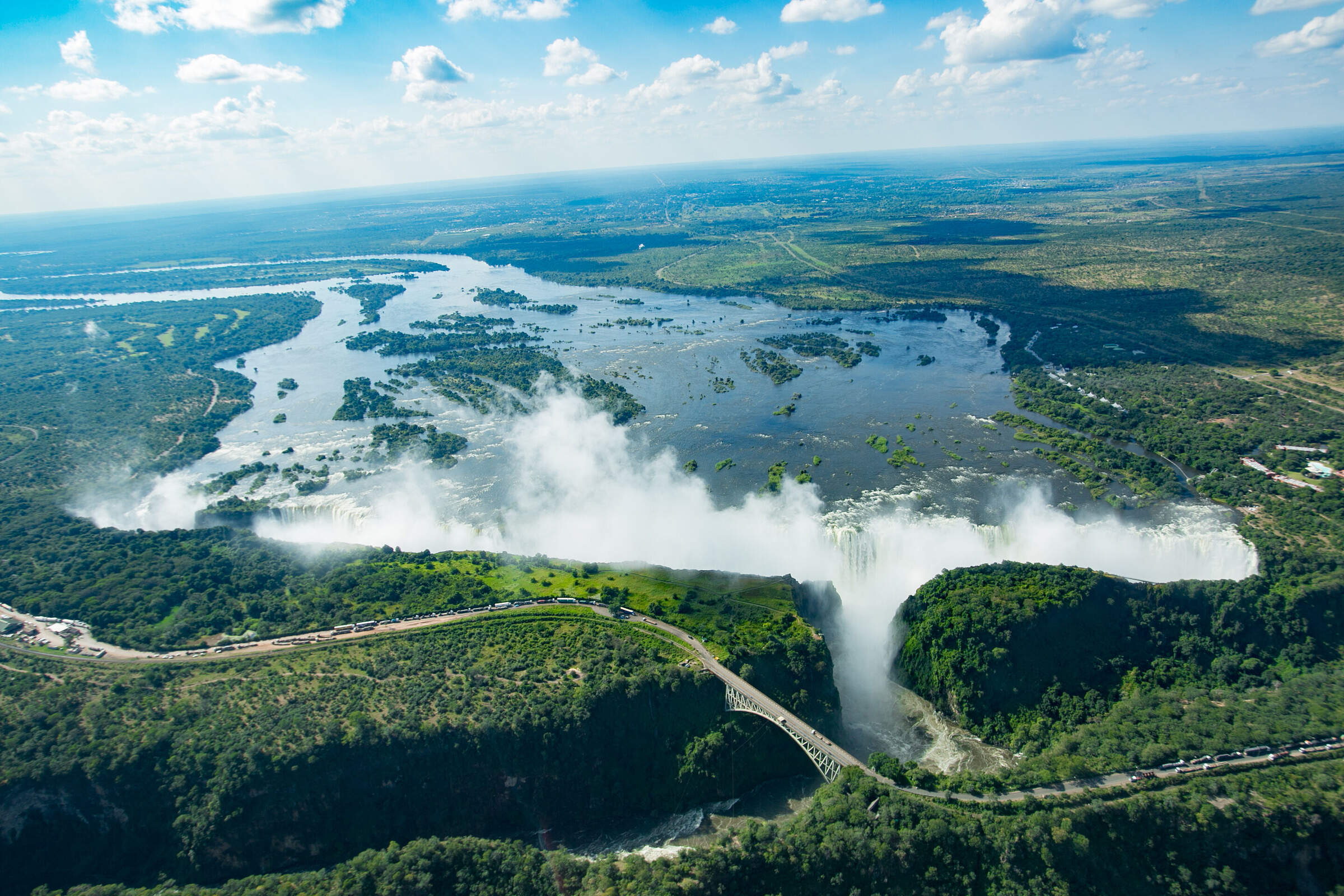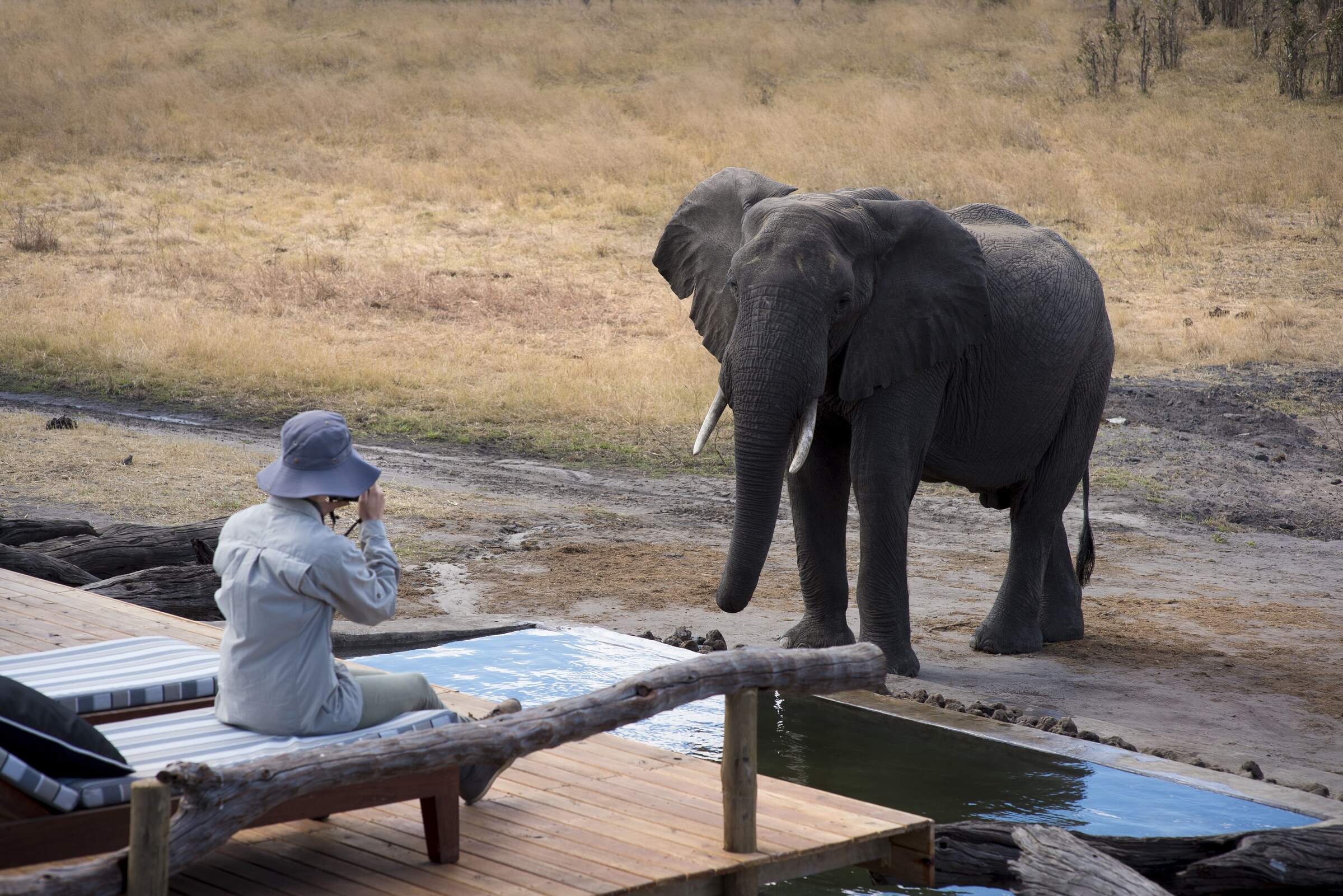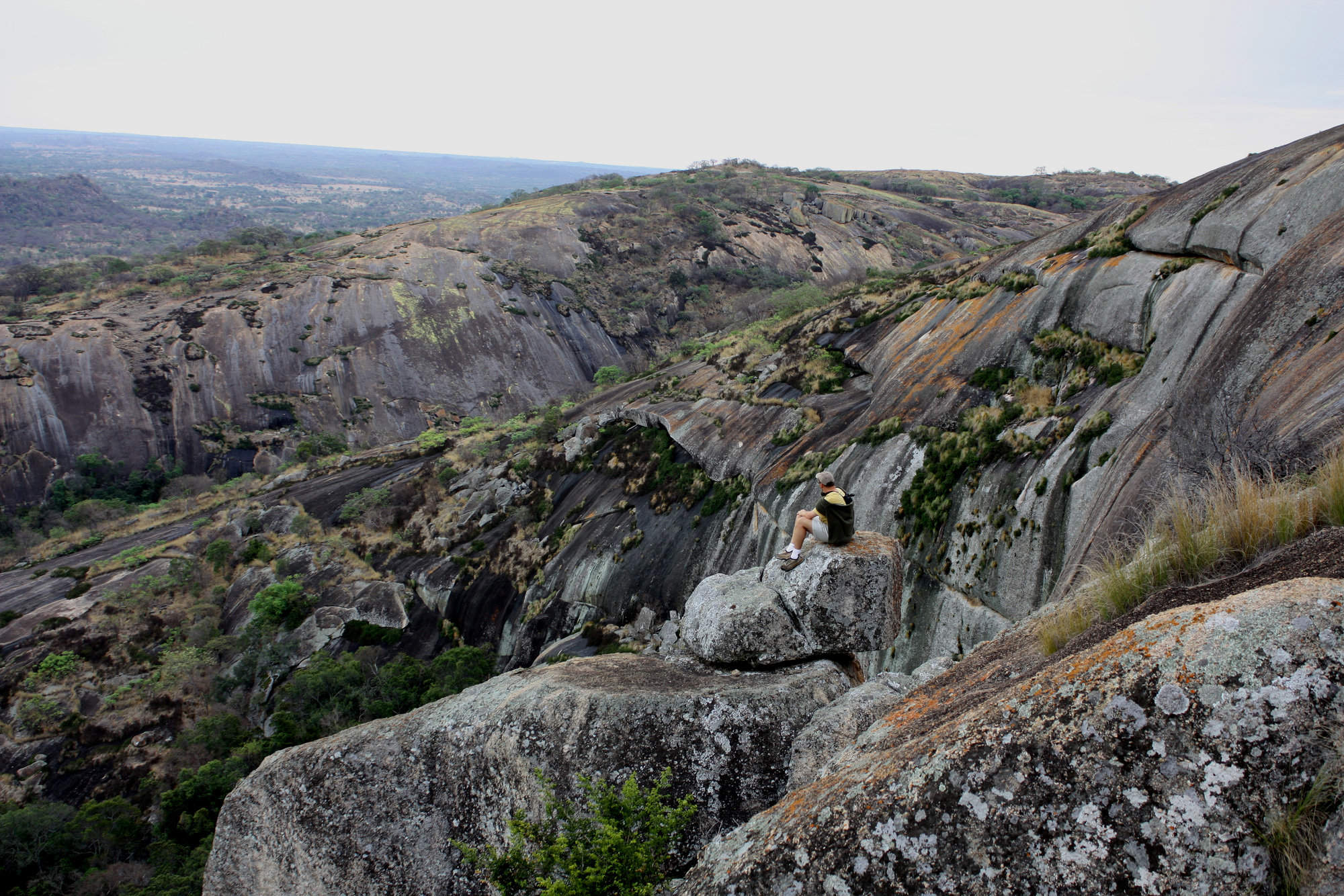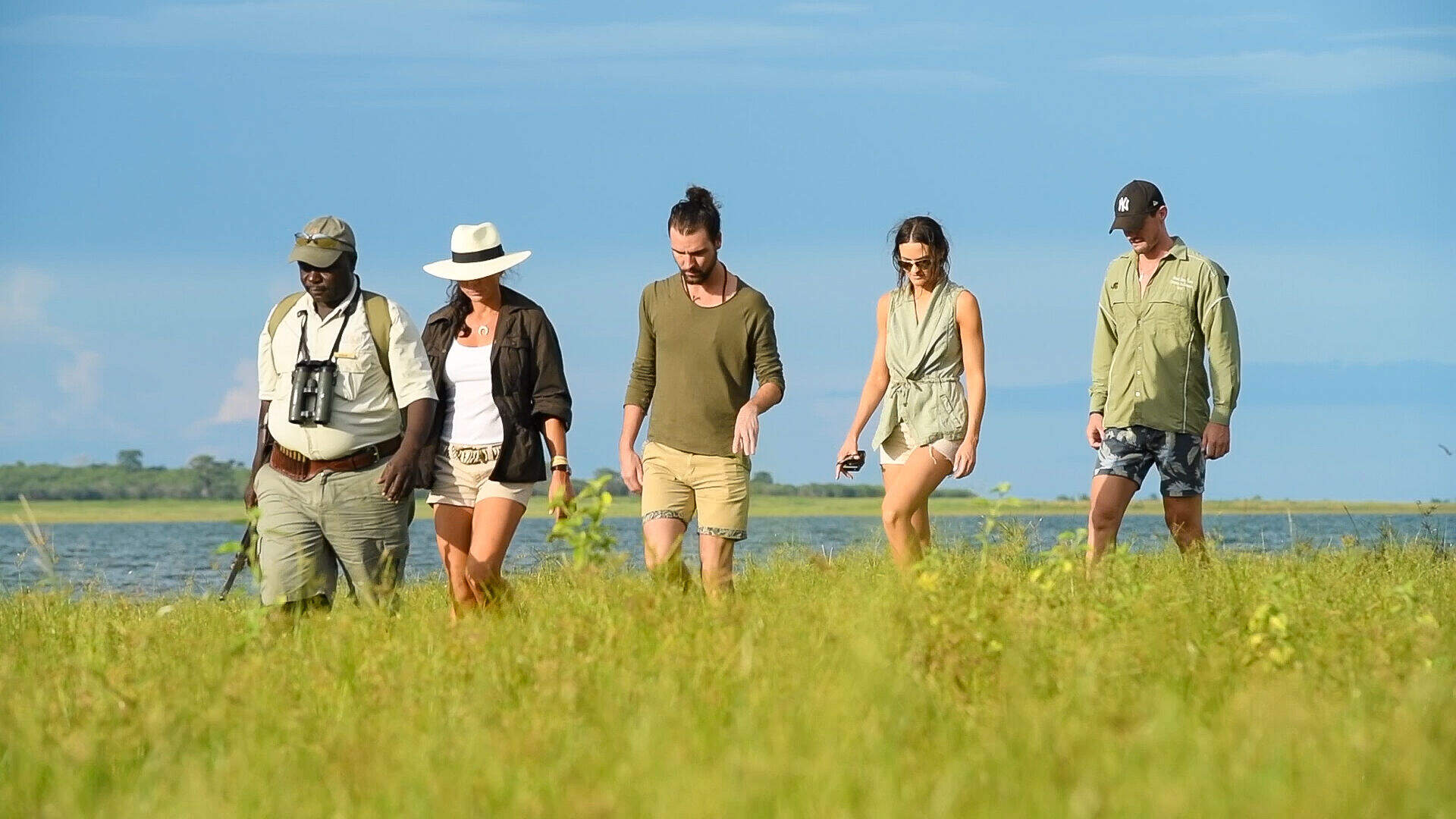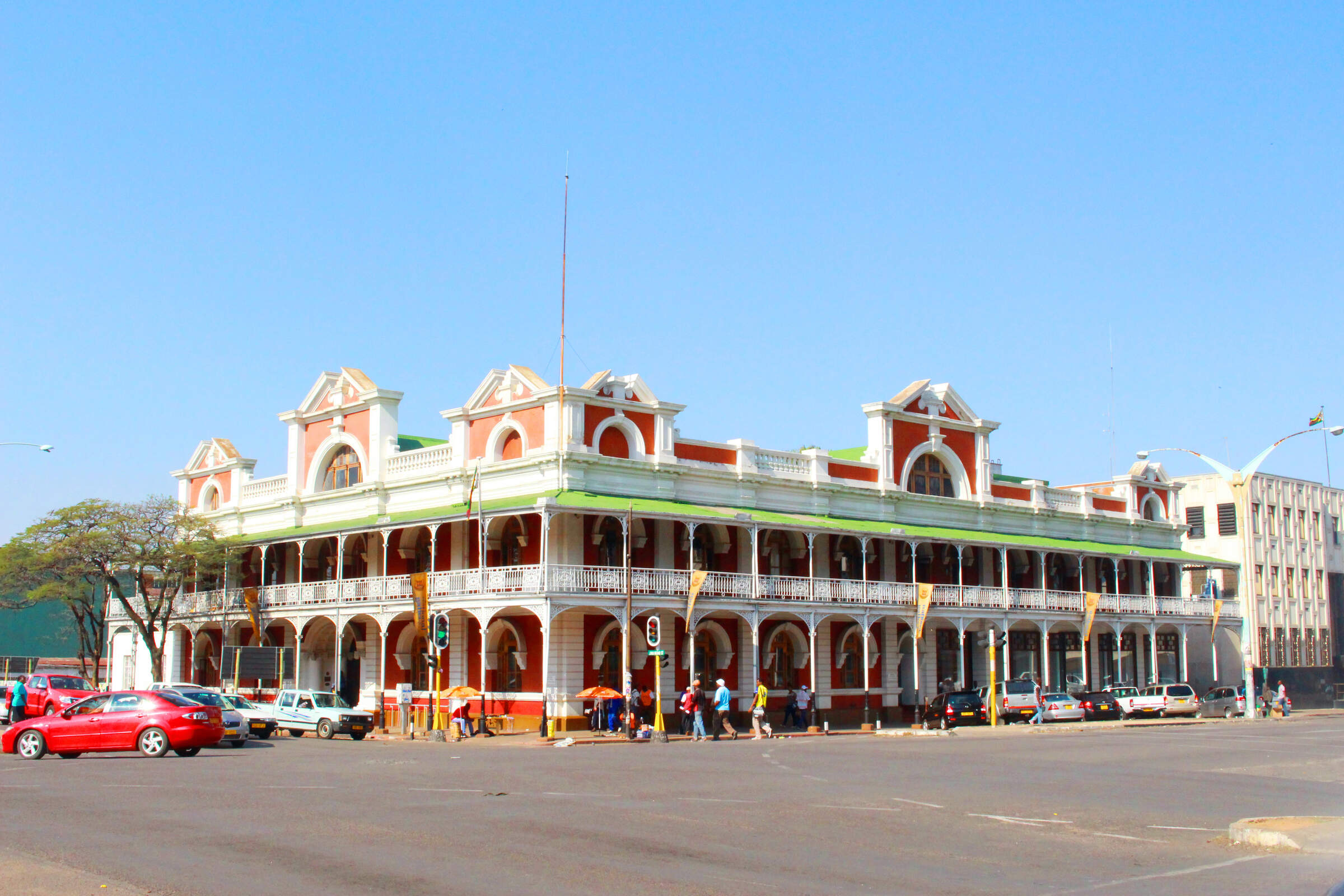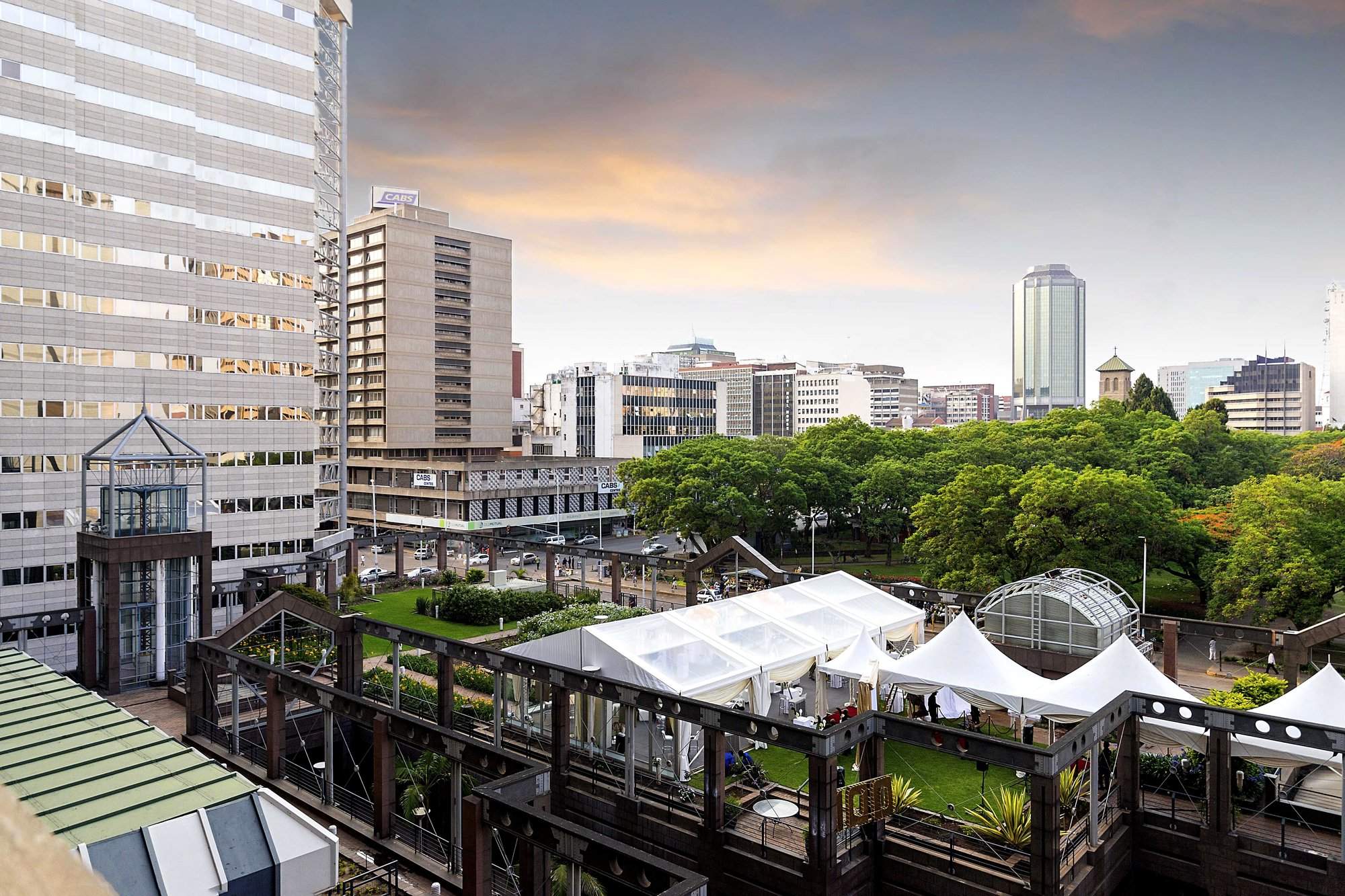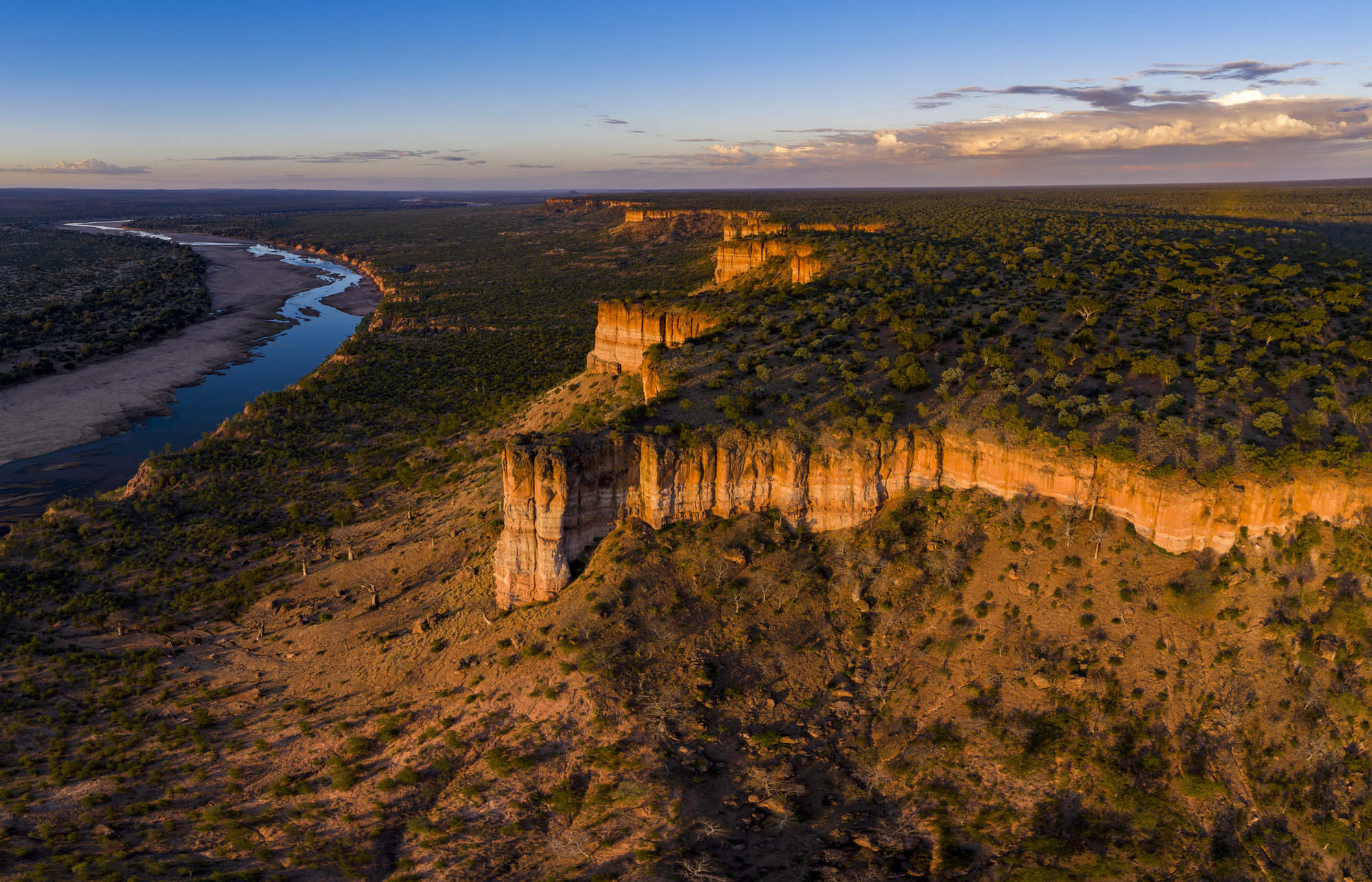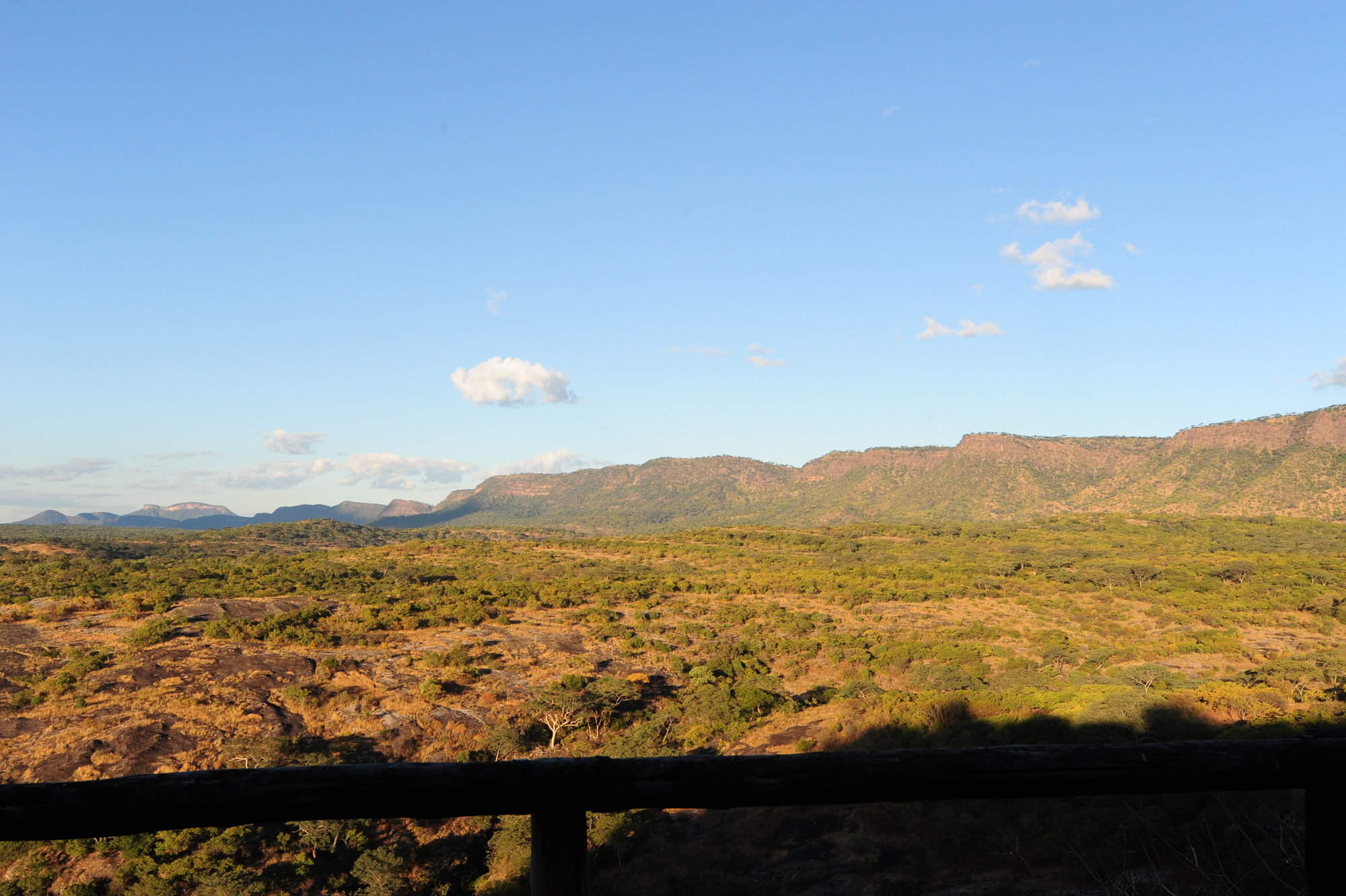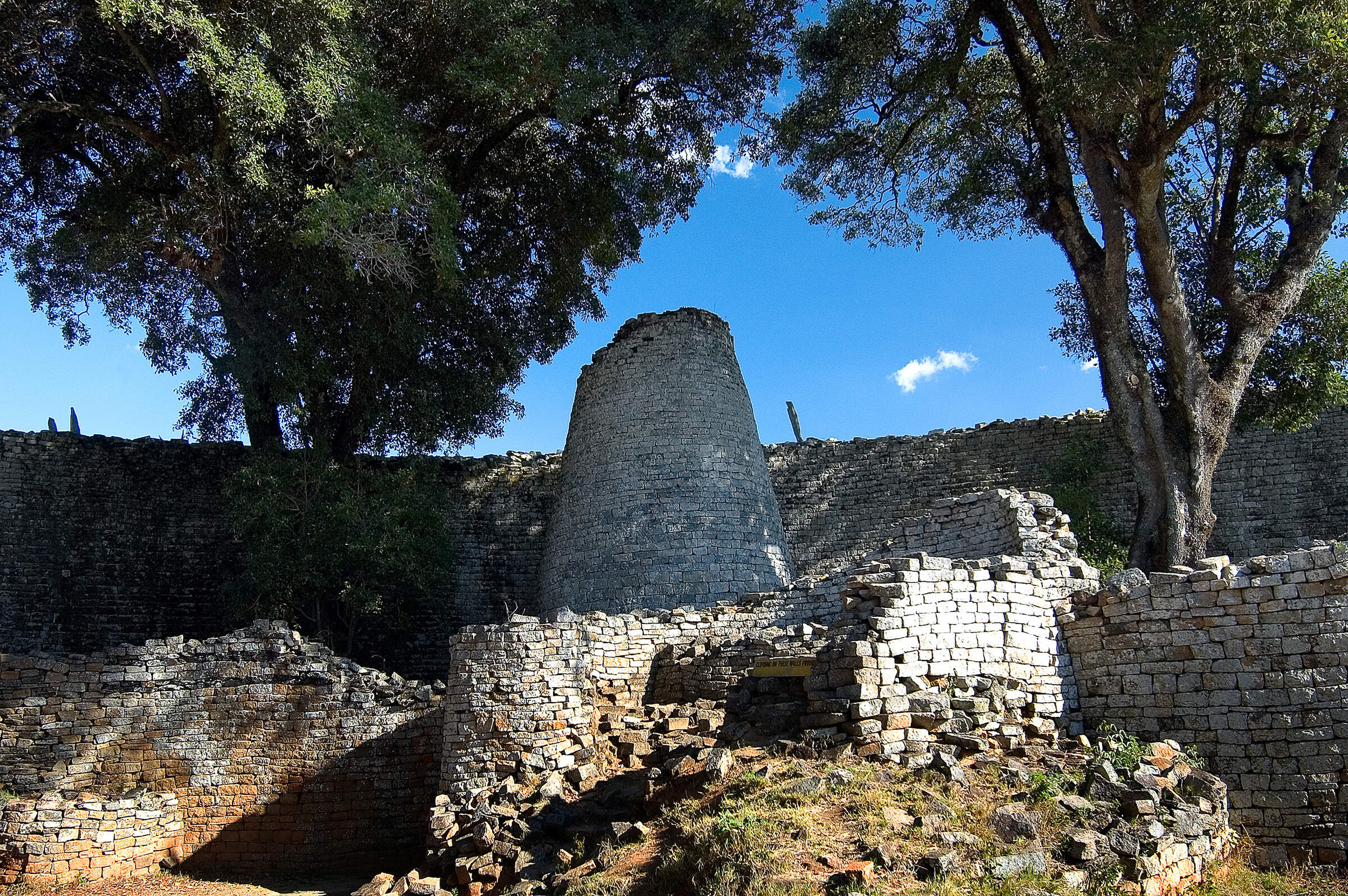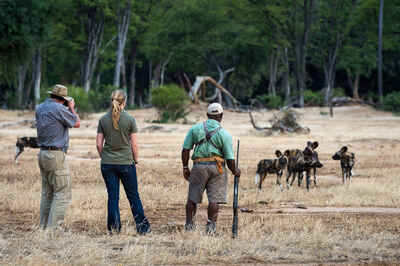
A haven for wildlife and walking safaris
Elephants really do stand on their back legs
The elephant bulls are mostly very relaxed
Not a normal visitors position for photographs
Mana Pools National Park
Mana Pools National Park
Mana Pools National Park is unique; it's a World Heritage Site. Great for walking and canoeing safaris to view the abundant wildlife, including a healthy elephant population.
After leaving Lake Kariba, the Zambezi River continues east through the huge rift valley, widening and slowing down as it meanders through the Lower Zambezi Valley. It’s flanked by Zambia’s Lower Zambezi National Park on its north bank, and Zimbabwe’s Mana Pools National Park to the south.
Over millennia, the wide and slow Zambezi has changed its course, with the river’s old meanders leaving small oxbow lakes, surrounded by lush vegetation and tall stands of ebony and mahogany trees. Within the national park, these oxbow lakes have created four large pools (‘mana’ being the Shona word for ‘four’, giving the park its name) and these, along with the permanent Zambezi River, provide an abundance of water and greenery which in turn attract a wealth of big game and result in some stunning scenery.
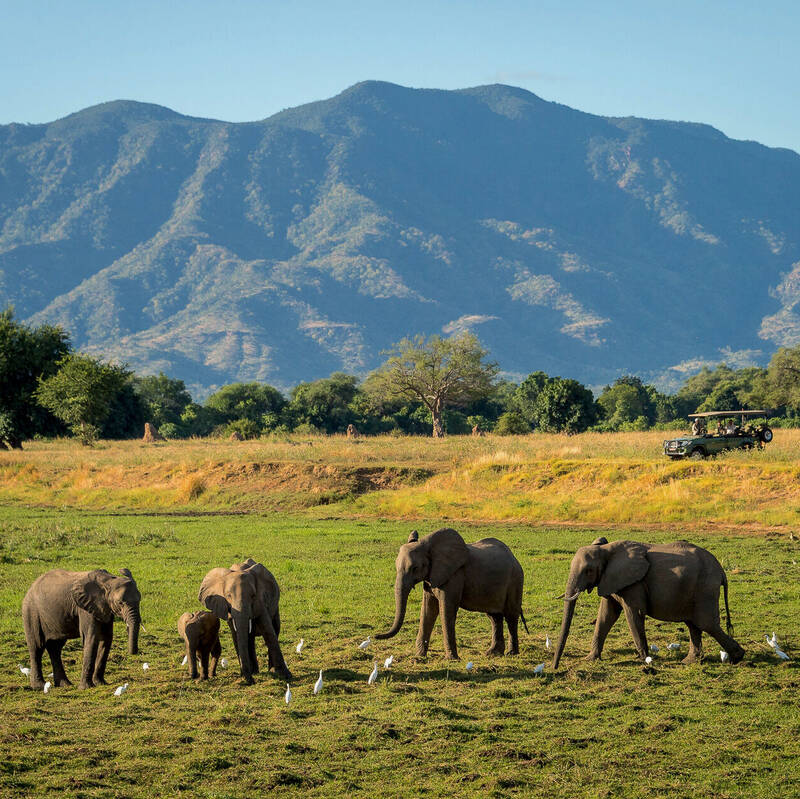
Safaris visiting Mana Pools
Just ideas, we'll always tailor-make a trip for you
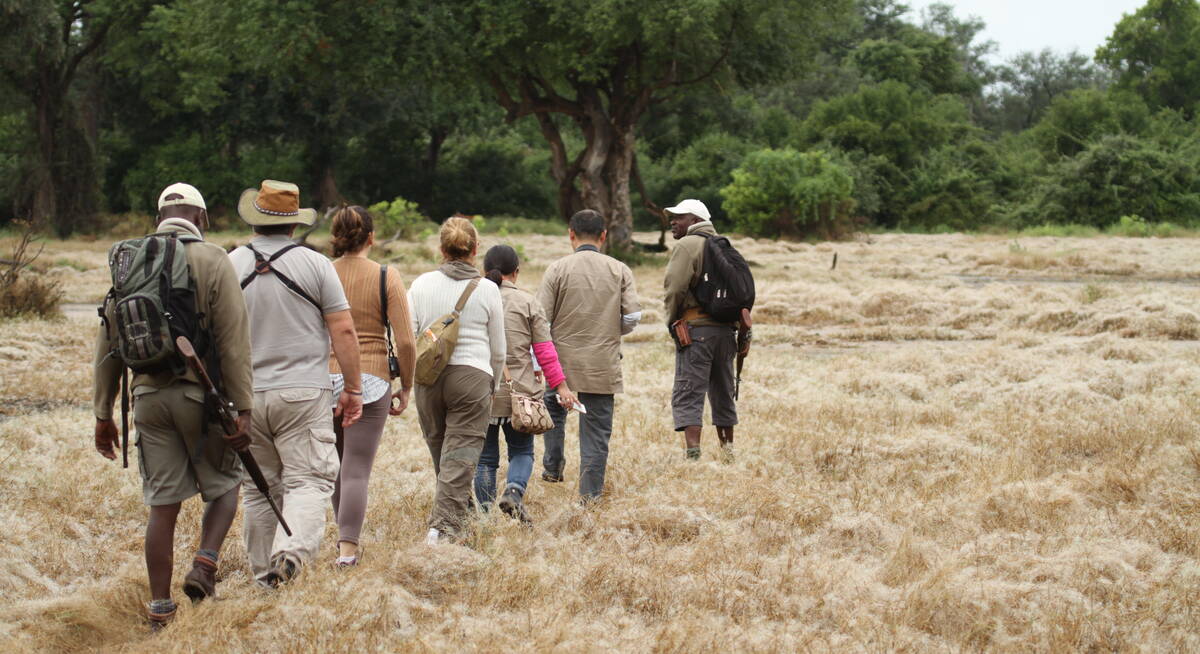
Buffalo Safari
9 days • 3 locations
HARARE AIRPORT TO VICTORIA FALLS AIRPORT
Combining Zimbabwe’s Mana Pools and Hwange national parks with stays at intimate six-tent safari camps offering excellent walking, canoeing and game drives. Superb wildlife viewing and a real wilderness-focused experience.
US$8,840 - US$11,910 per person
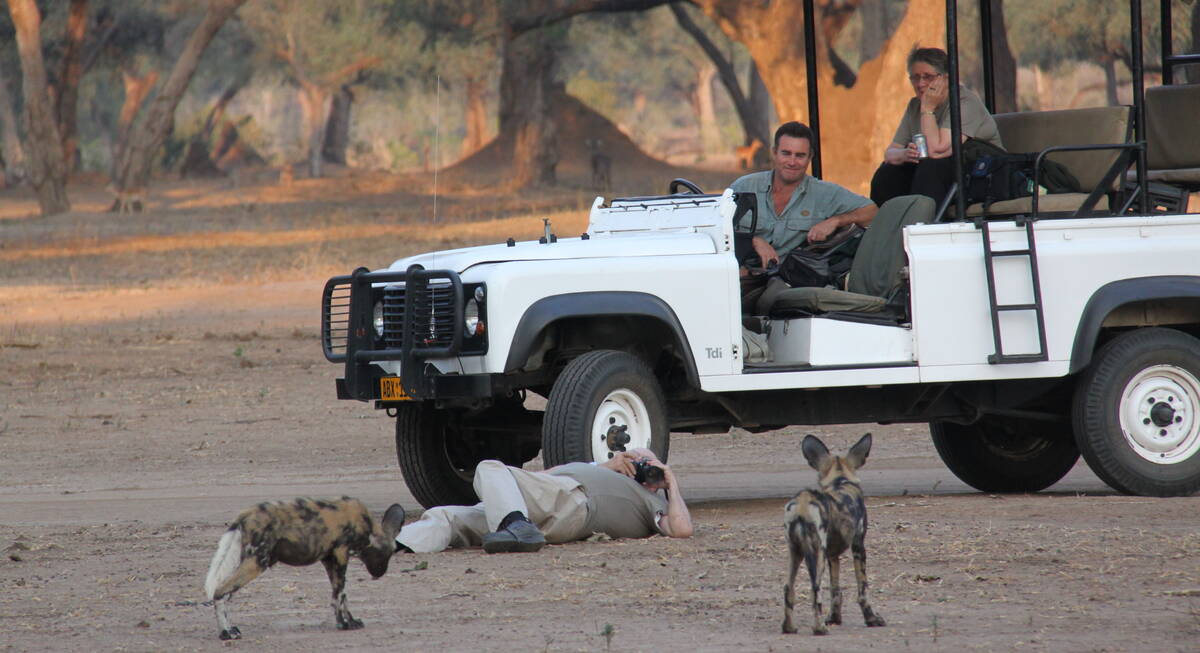
Lion Safari
7 days • 2 locations
VICTORIA FALLS AIRPORT TO VICTORIA FALLS AIRPORT
The classic Expert Africa Zimbabwe safari. Combining two of our favourite independent camps, each run by celebrated guides, exciting game drives, world-class walks and canoeing in premier wildlife watching destinations.
US$7,300 - US$10,280 per person
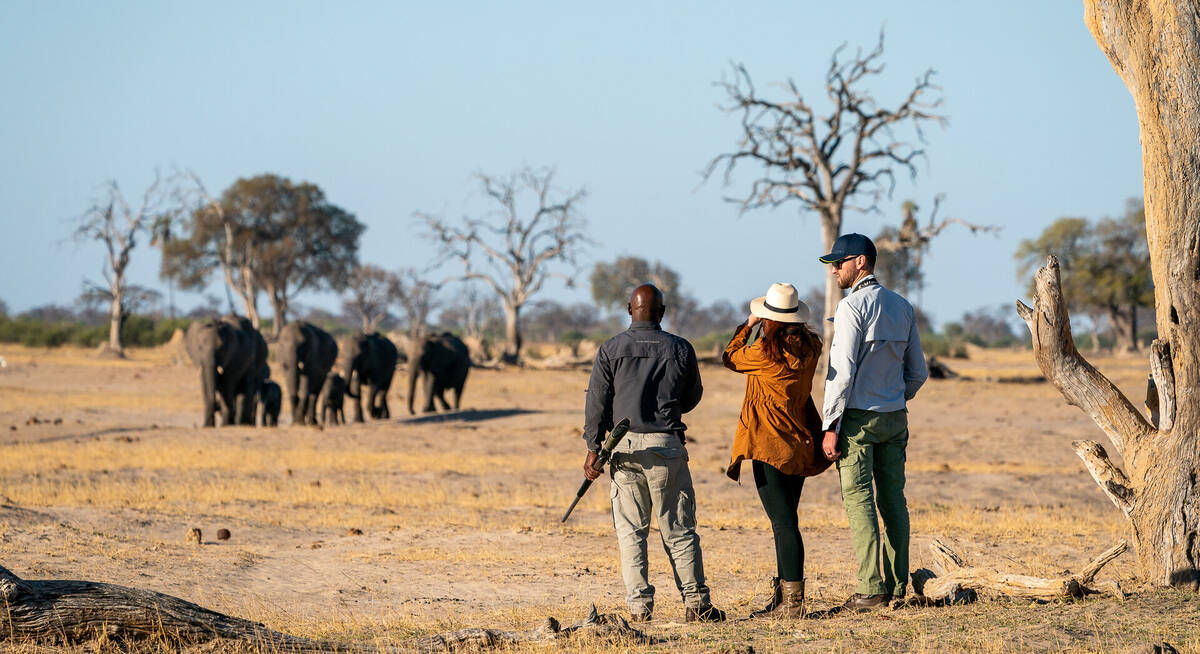
Nyala Safari
10 days • 3 locations
VICTORIA FALLS AIRPORT TO VICTORIA FALLS AIRPORT
A superb luxury safari in iconic Hwange and Mana Pools national parks, staying in a pair of the finest safari camps in Zimbabwe, with a grand finale at Victoria Falls
US$12,060 - US$16,260 per person
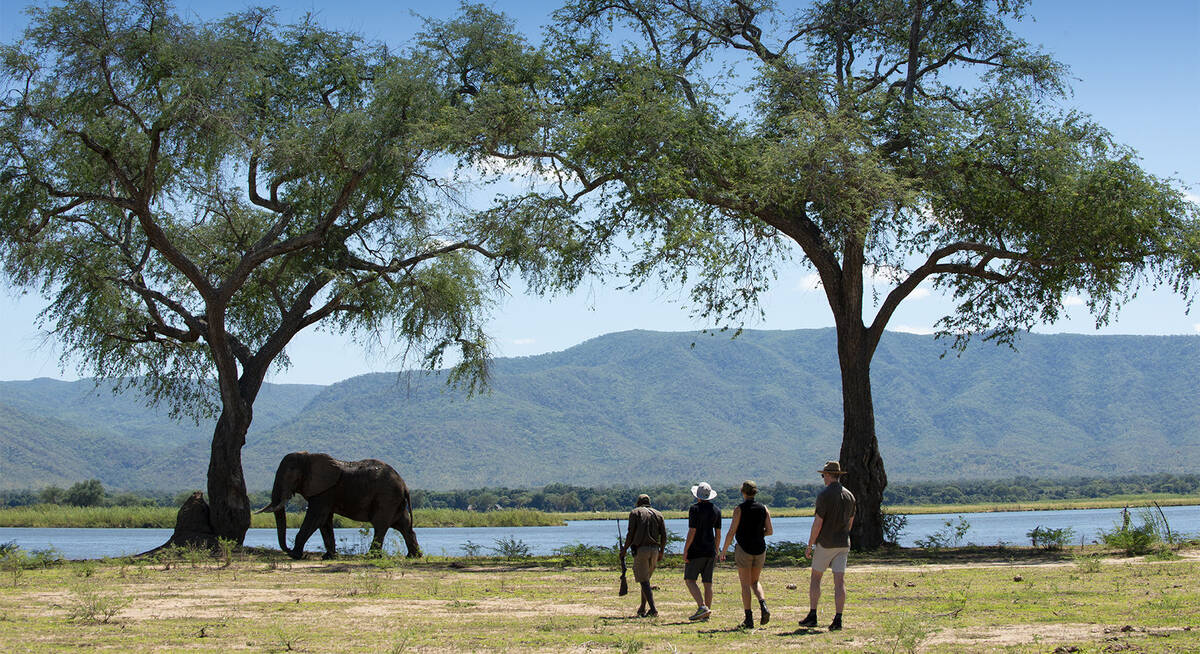
Grysbok Safari
9 days • 3 locations
VICTORIA FALLS AIRPORT TO HARARE AIRPORT
Discover three of Zimbabwe’s iconic destinations in style, flying between Hwange, Mana Pools and Lake Kariba on this varied safari adventure staying at authentic yet luxurious camps.
US$11,070 - US$16,110 per person
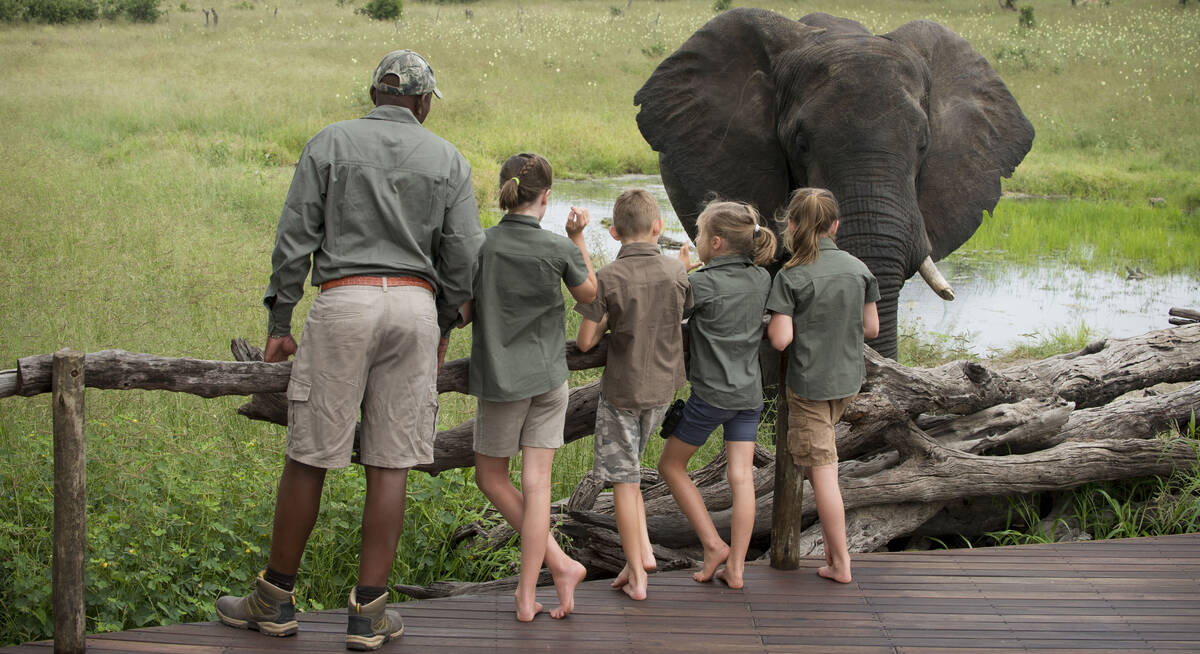
Pied Kingfisher Safari
9 days • 3 locations
VICTORIA FALLS AIRPORT TO HARARE AIRPORT
A luxury safari combining three of Zimbabwe's top highlights. The trip uses some of the finest safari camps in Zimbabwe and is perfect for a family or small group.
US$8,470 - US$11,860 per person
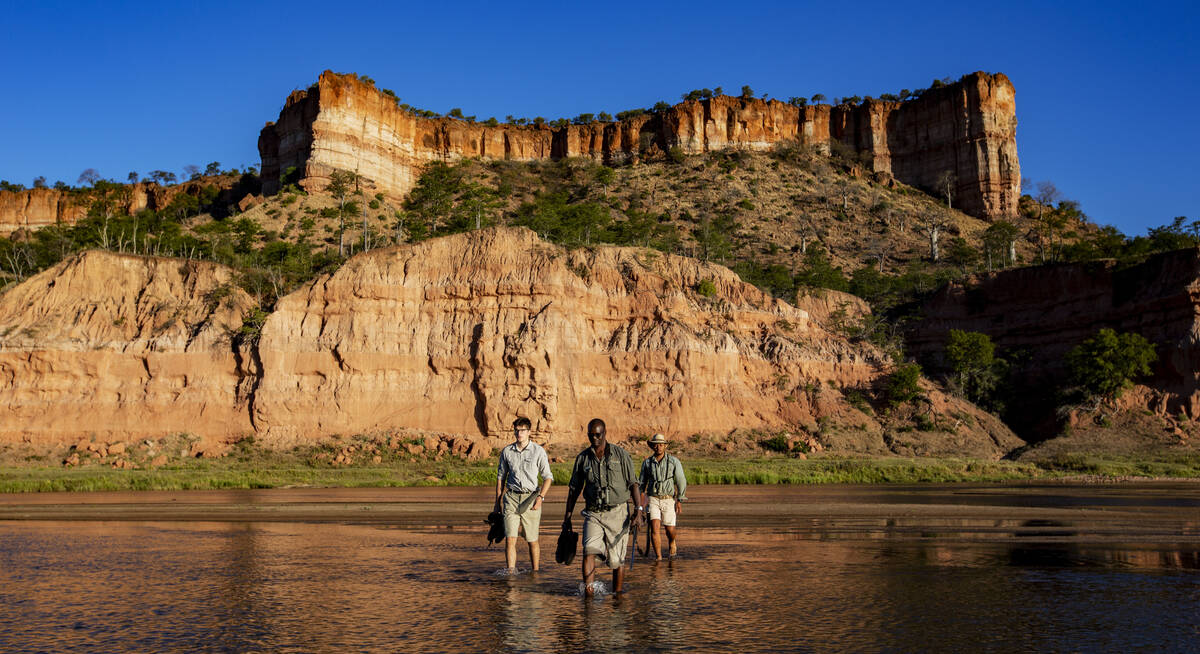
Bat Hawk Safari
7 days • 2 locations
HARARE AIRPORT TO JOHANNESBURG AIRPORT
Explore two areas revered by safari enthusiasts with some of Africa’s best walking and some superb guiding – even by Zimbabwe’s high standards – for a varied and wonderfully immersive wilderness experience.
US$8,670 - US$9,130 per person
Most recent reviews of our safaris to Mana Pools
Click below to browse all 103 reviews from Mana Pools National Park. All from our travellers; all are in full & unedited.
Arrived 3 Jun 2024, 6 nights
"My Jun 2024 trip"
Overall rating: Excellent
Arrived 12 May 2024, 14 nights
"My May 2024 trip"
Overall rating: Excellent
Arrived 28 Apr 2024, 14 nights
"My Apr 2024 trip"
Overall rating: Excellent
Arrived 10 Apr 2024, 9 nights
"Shy animals, still loved it."
Overall rating: Good
Arrived 10 Apr 2024, 9 nights
"My Apr 2024 trip"
Overall rating: Excellent
Arrived 5 Oct 2023, 28 nights
"Our Oct 2023 trip"
Overall rating: Excellent
Arrived 25 Aug 2023, 10 nights
"My Aug 2023 trip"
Overall rating: Excellent
Arrived 16 Jun 2023, 8 nights
"My Jun 2023 trip"
Overall rating: Excellent
Arrived 11 Oct 2022, 13 nights
"Our fabulous safari Oct 2022 trip - no. 10"
Overall rating: Excellent
Arrived 23 Sep 2022, 9 nights
"My Sep 2022 trip"
Overall rating: Good
Where to stay in Mana Pools
Our suggestions for safari camps in Mana Pools National Park
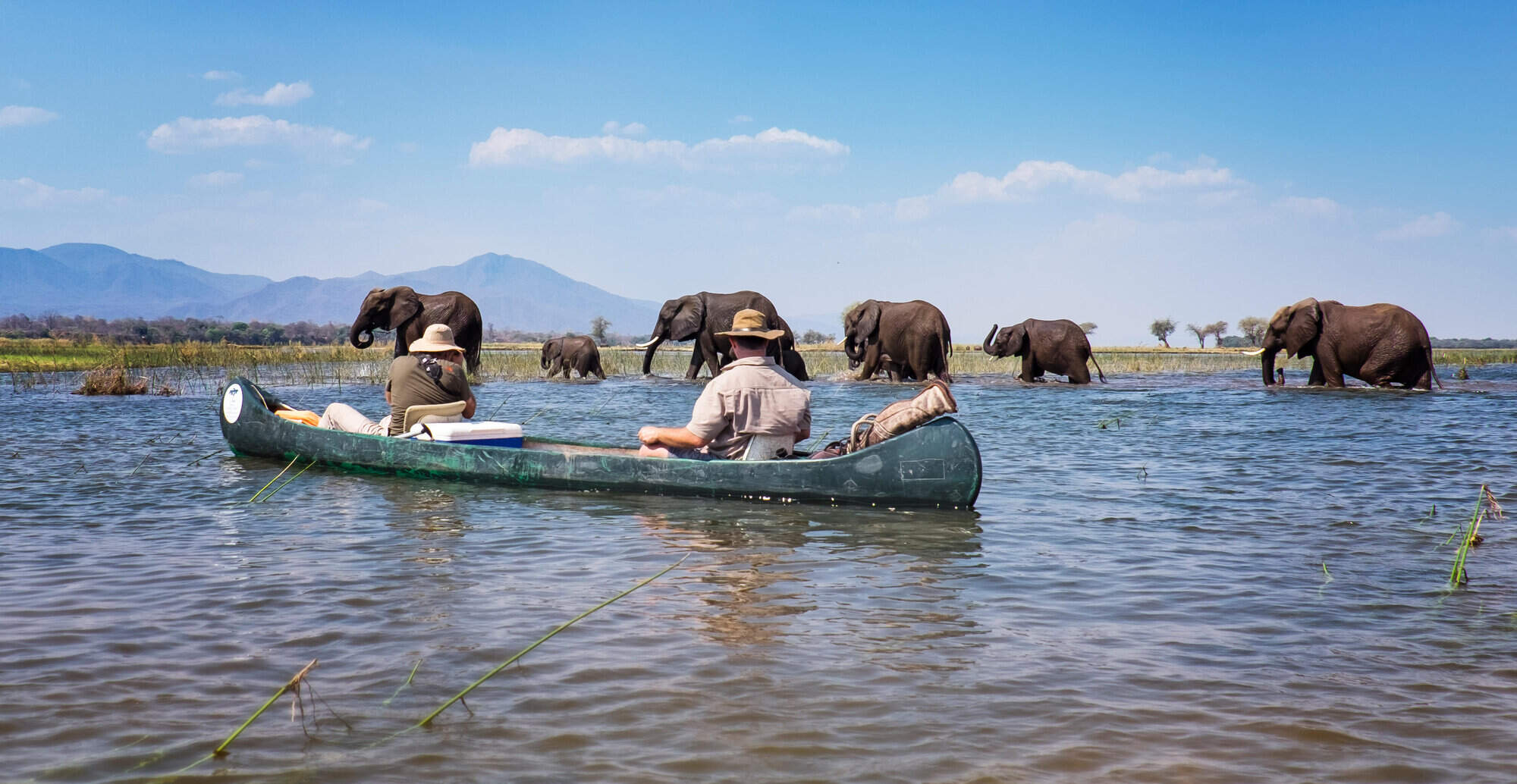
Vundu Camp
Overlooking the Zambezi River in Mana Pools National Park, Vundu Camp is a small, comfortable bushcamp offering top-notch guiding.
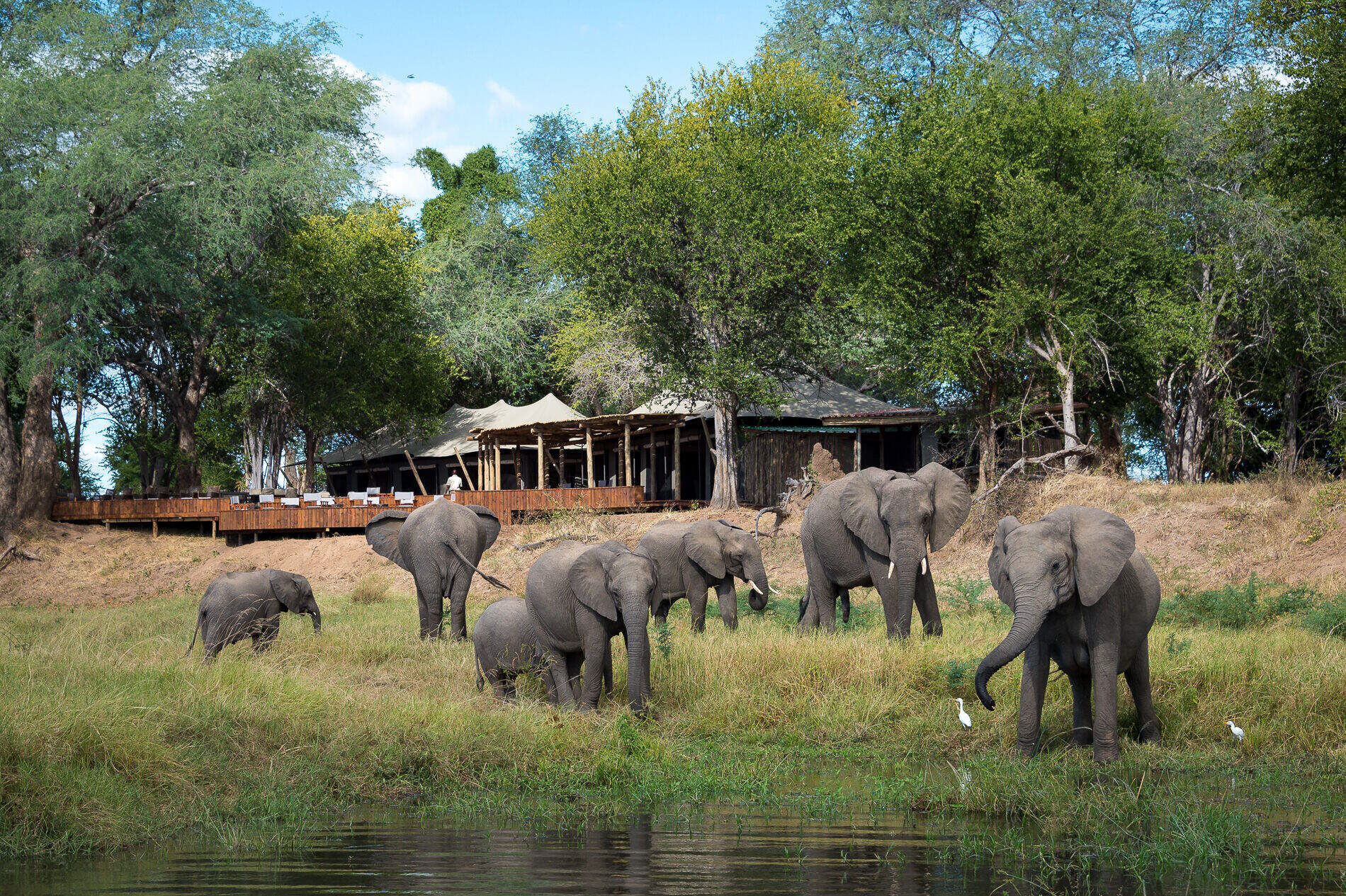
Ruckomechi Camp
In a very scenic spot beside the Zambezi, Ruckomechi is a smart camp offering excellent walking, river safaris, night and day 4WD game drives.
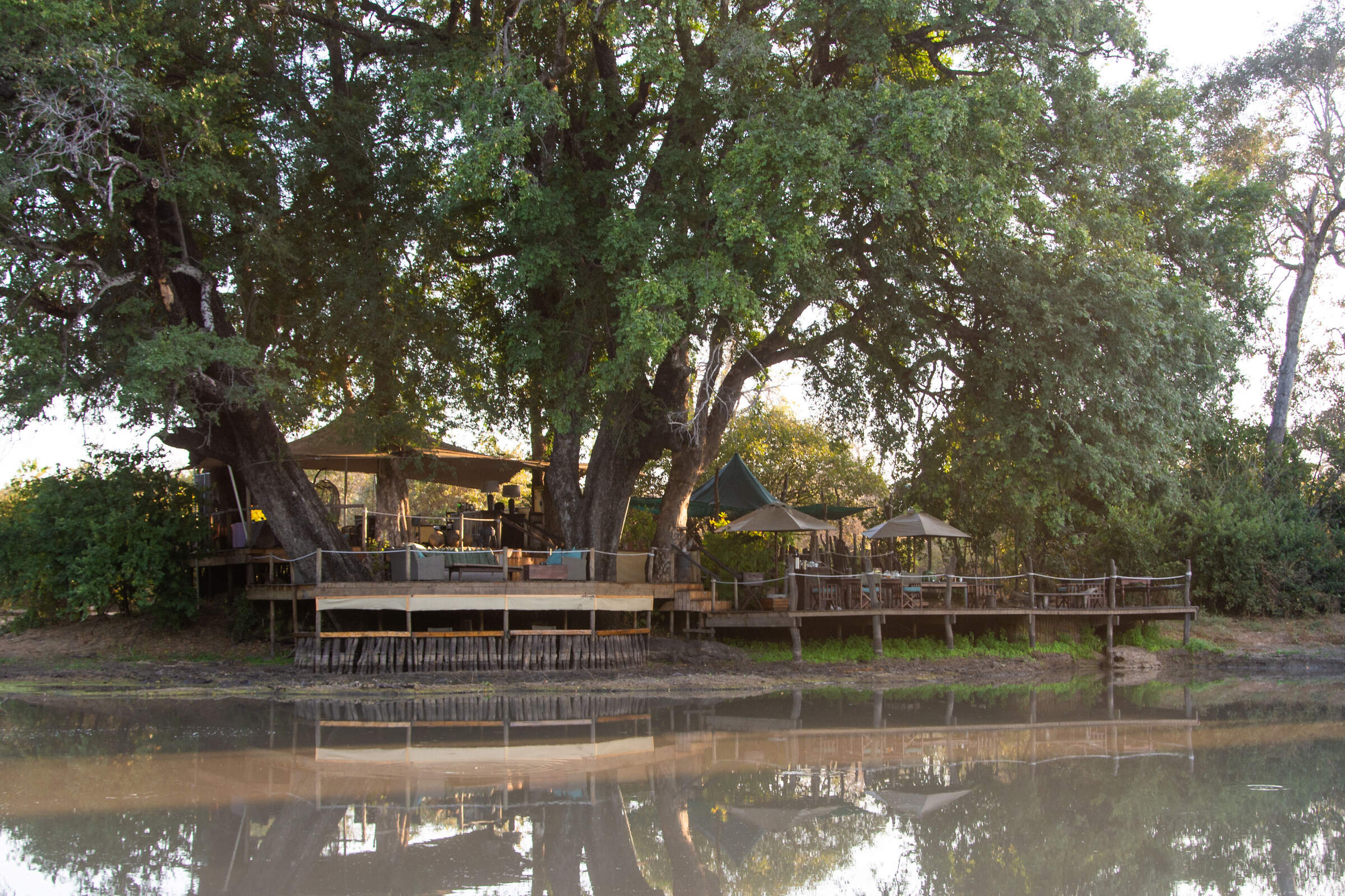
Kanga Bush Camp
Unspoiled and peaceful, Kanga Bush Camp is located in a remote and exclusive part of Mana Pools National Park, overlooking the Kanga Pan.
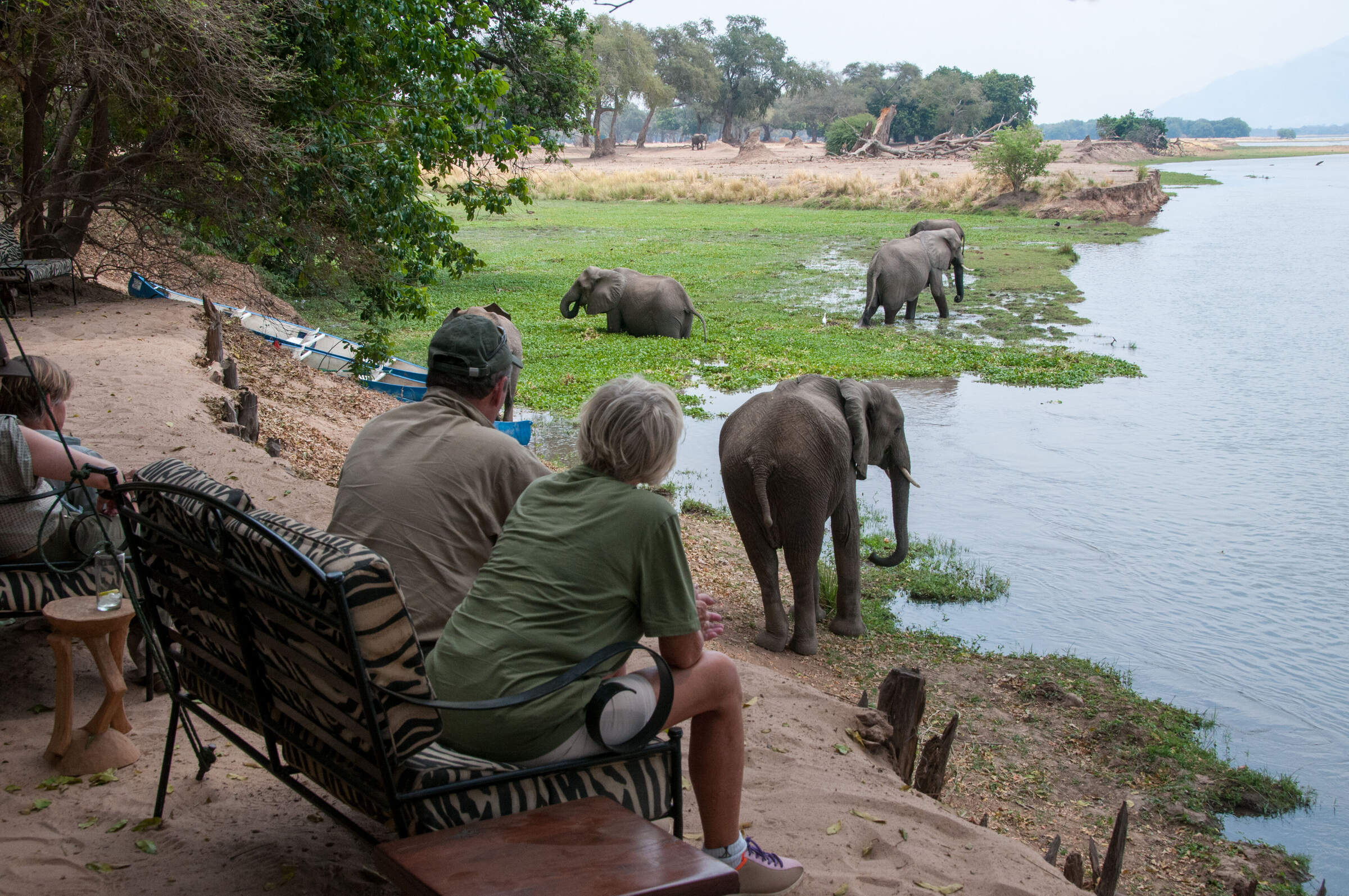
Stretch Ferreira Safaris
Stretch Ferreira Safaris Camp is a small, owner-run camp on the banks of the Zambezi River in Mana Pools National Park, with the emphasis on great guiding.
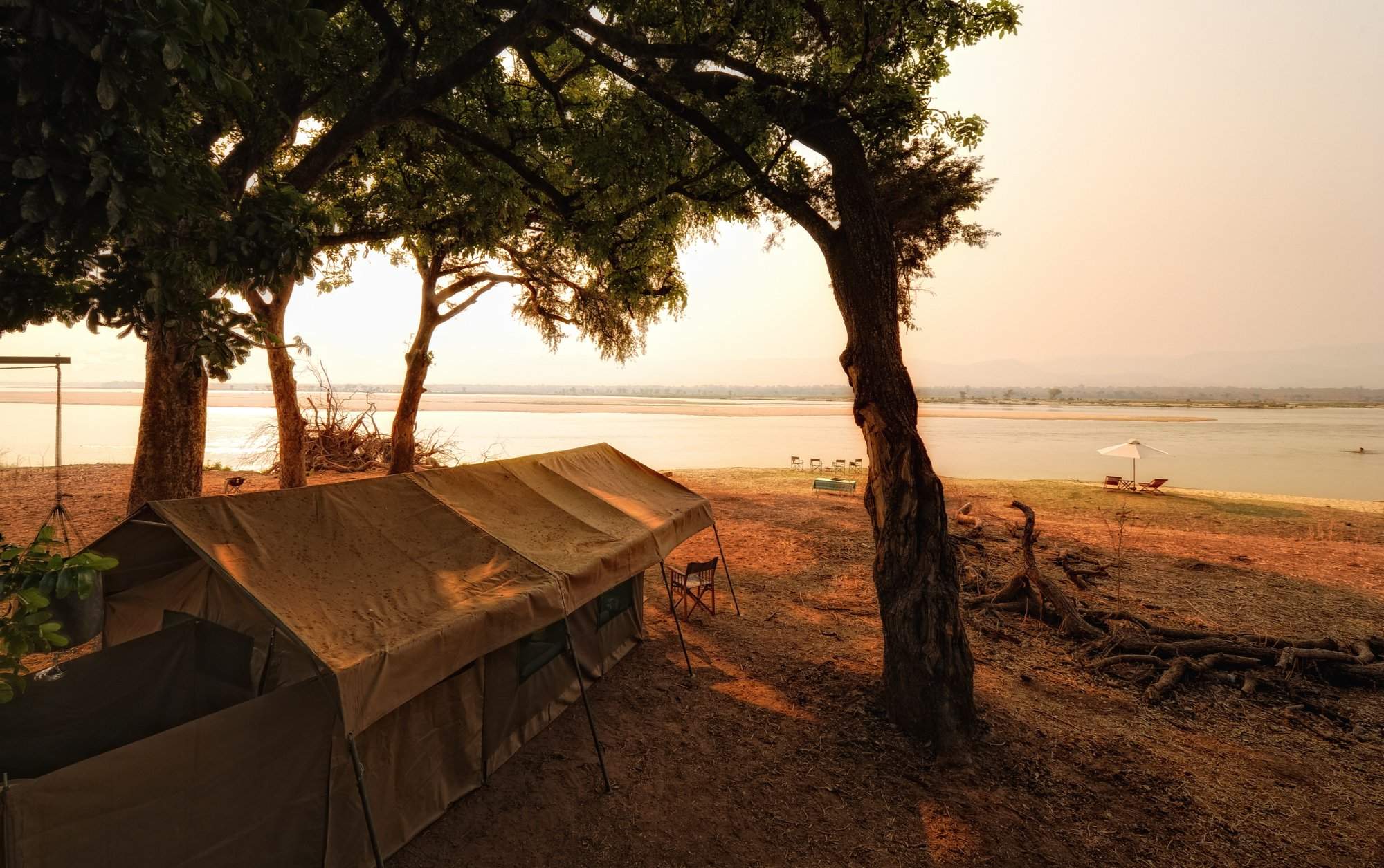
Zambezi Expeditions
Zambezi Expeditions is a simple, semi-permanent camp along the Zambezi River that offers excellent guiding and standards of service.
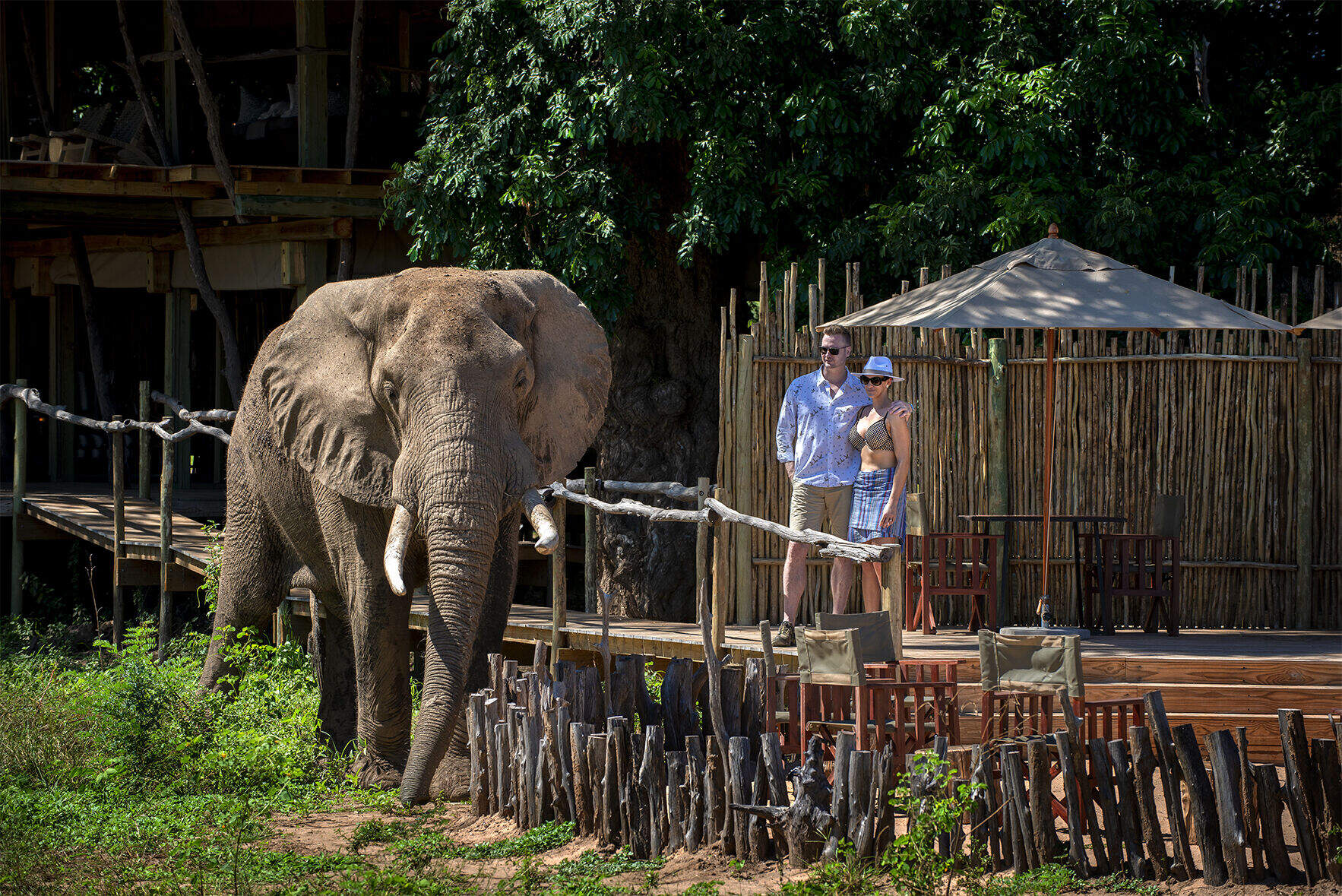
Nyamatusi Camp
Overlooking the Zambezi River, the luxury Nyamatusi Camp occupies a pristine wilderness environment.
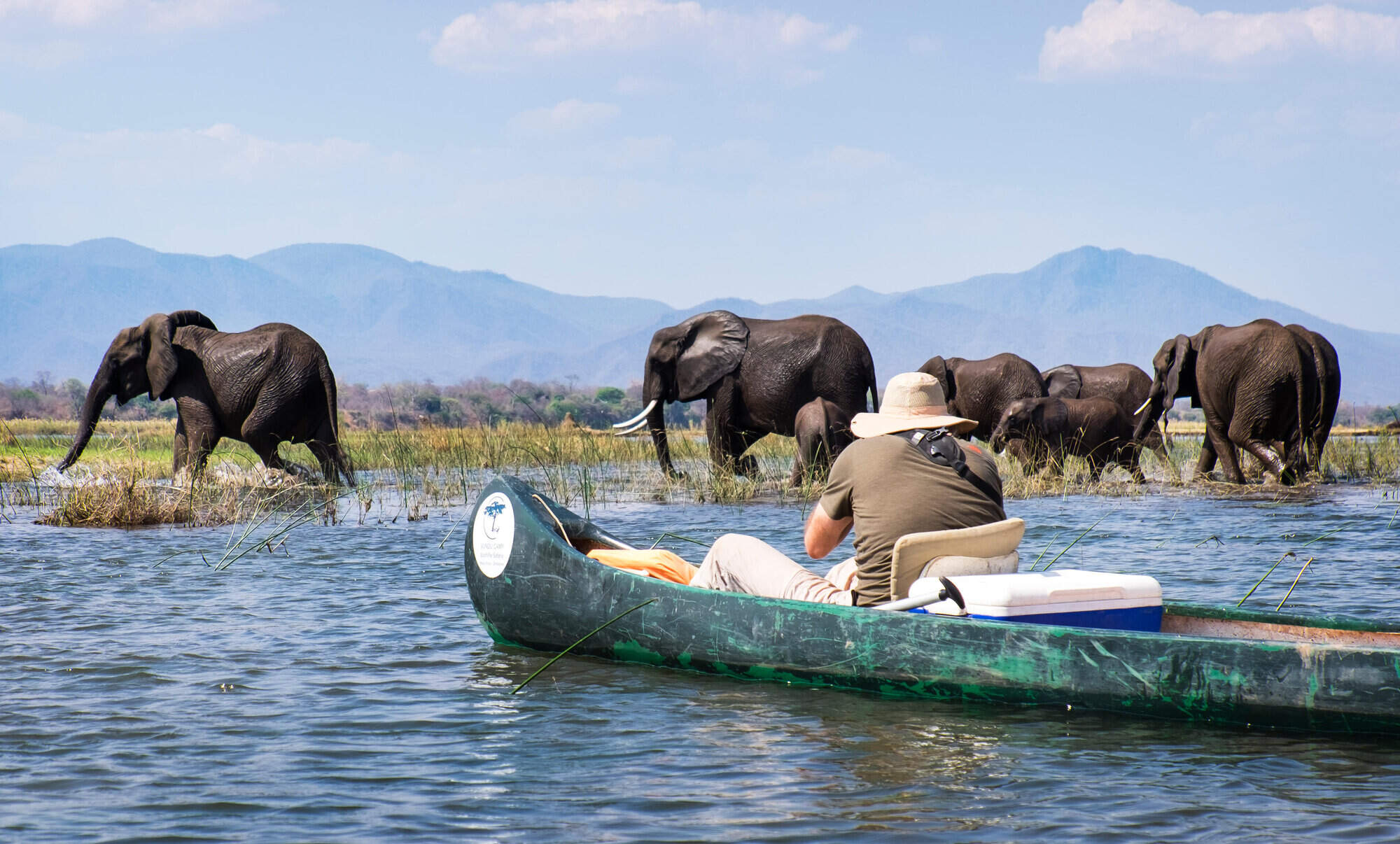
Little Vundu
Closely associated with Vundu Camp, Little Vundu has the same great location and quality of guides, and is occasionally used for private group bookings.
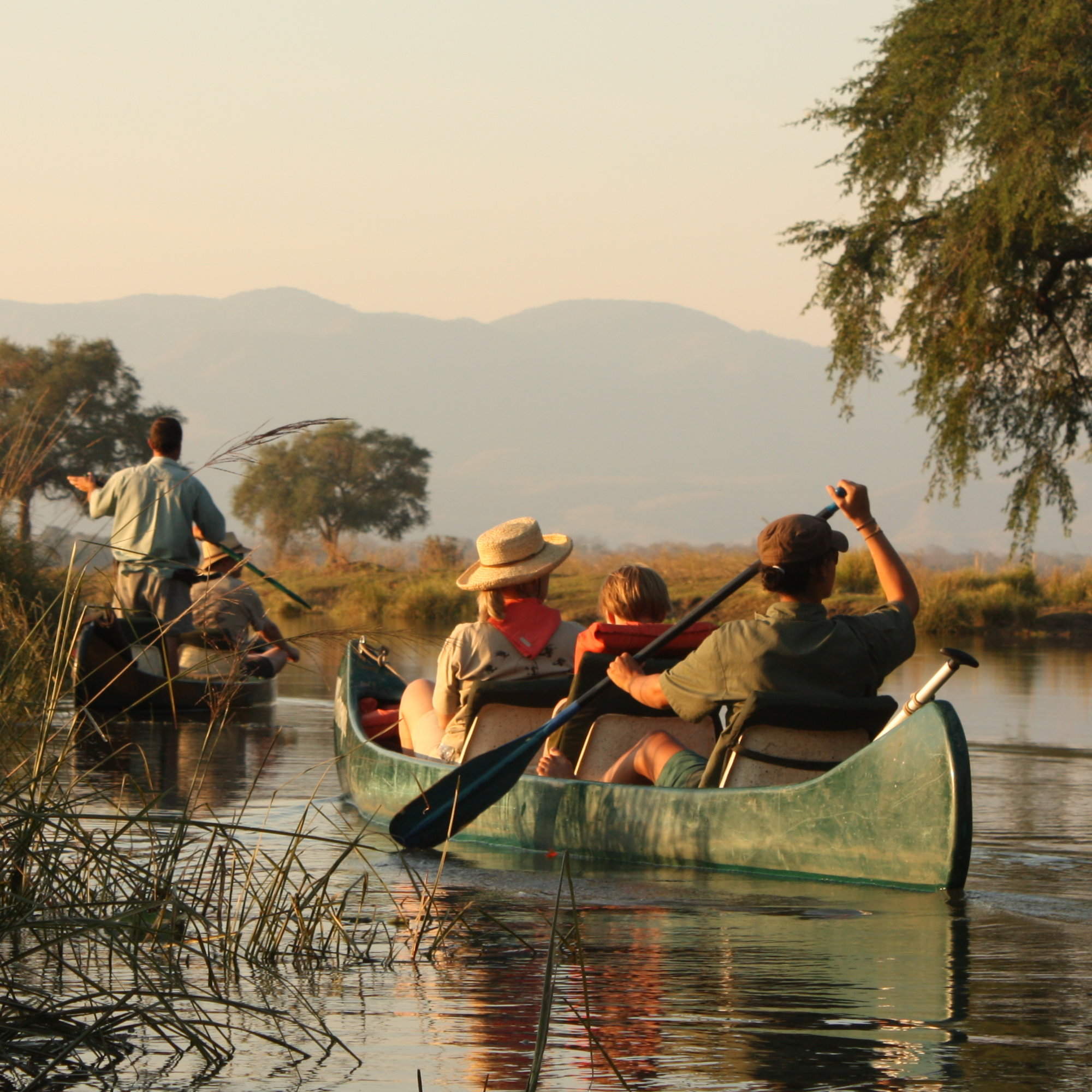
Mana Canoe Trail
The Canoe Trail is a multi-day trip, along the Zambezi with some of the best guides in Africa. Each night you'll camp on the banks of the river.
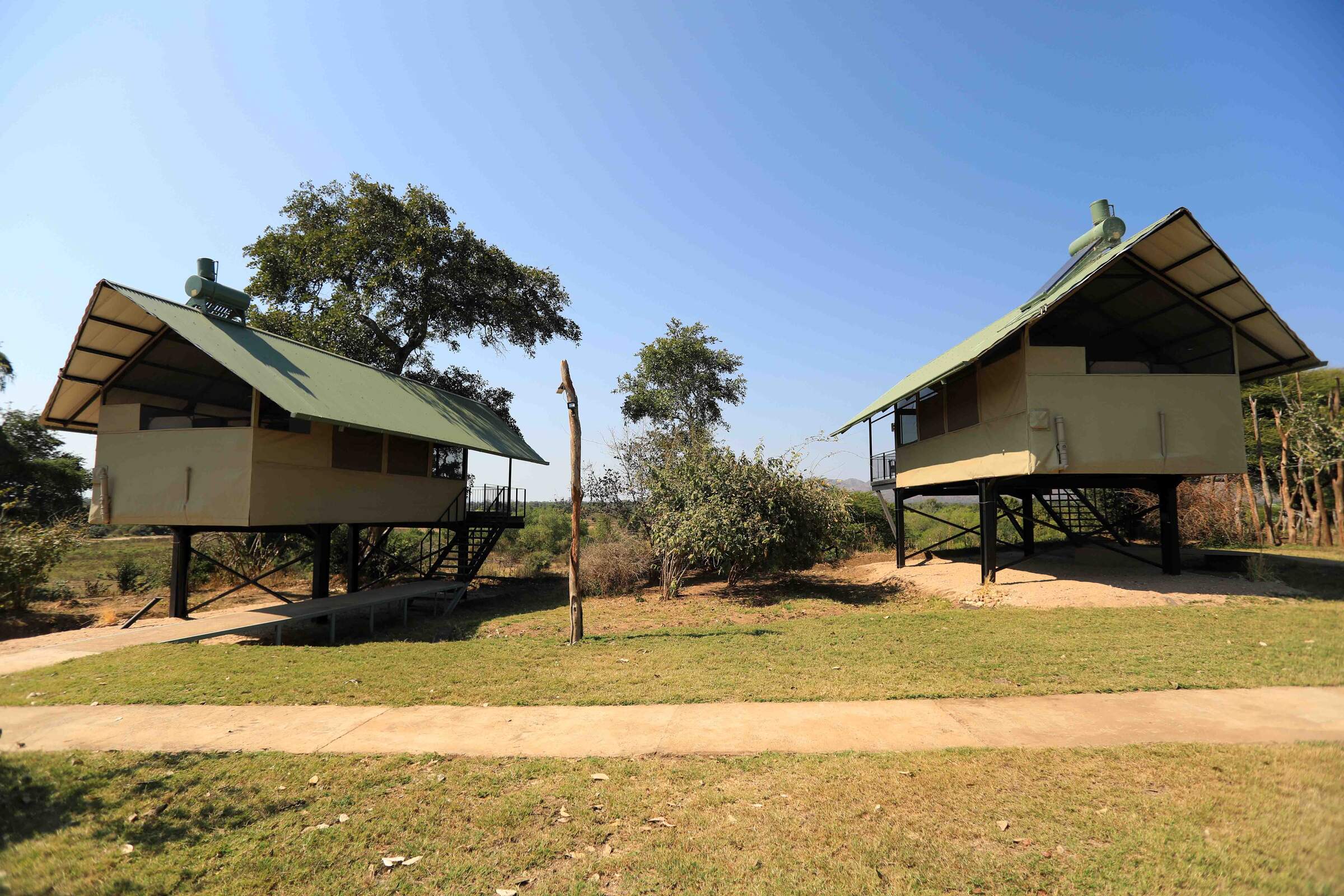
Kavinga Safari Camp
Kavinga is a comfortable tented camp tucked away in a less-visited area of Mana Pools National Park with surprisingly good wildlife and an excellent hide.
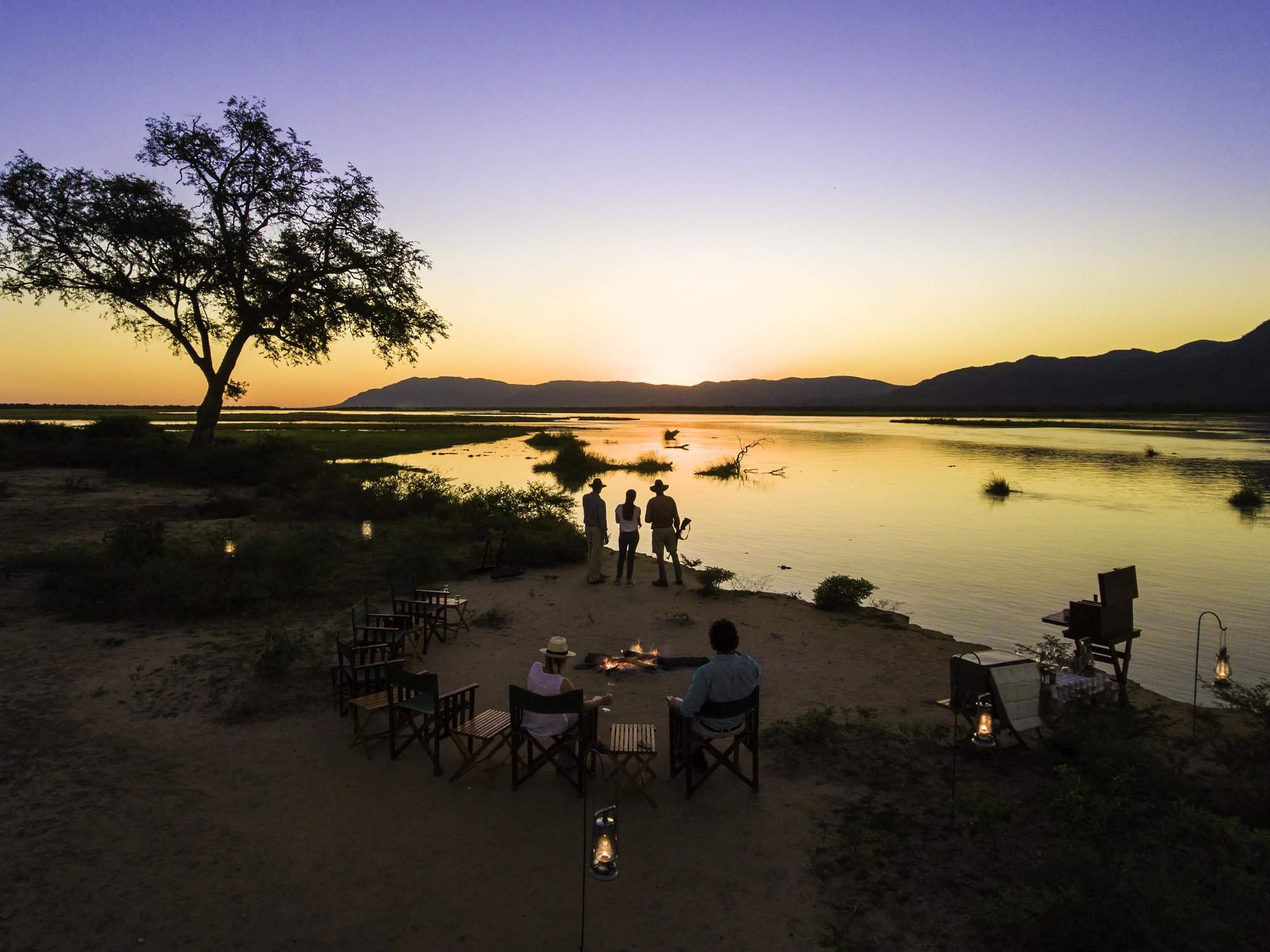
John's Camp
John's Camp is a semi-mobile tented camp offering walking safaris, game drives, and fishing in Zimbabwe's Mana Pools National Park.
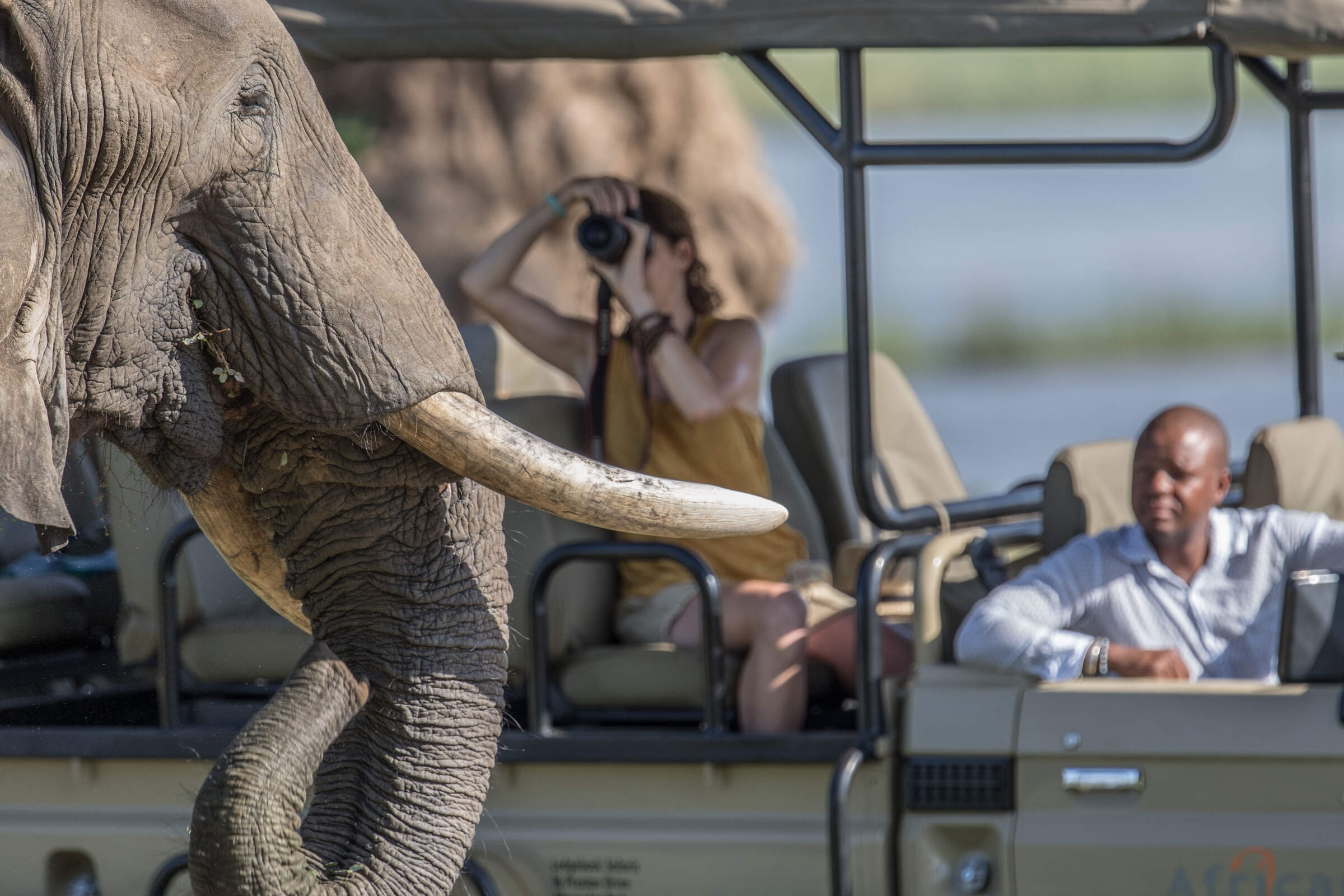
Nyamatusi Mahogany
Nyamatusi Mahogany is a family-friendly, yet remote and luxurious safari camp in Mana Pools National Park.
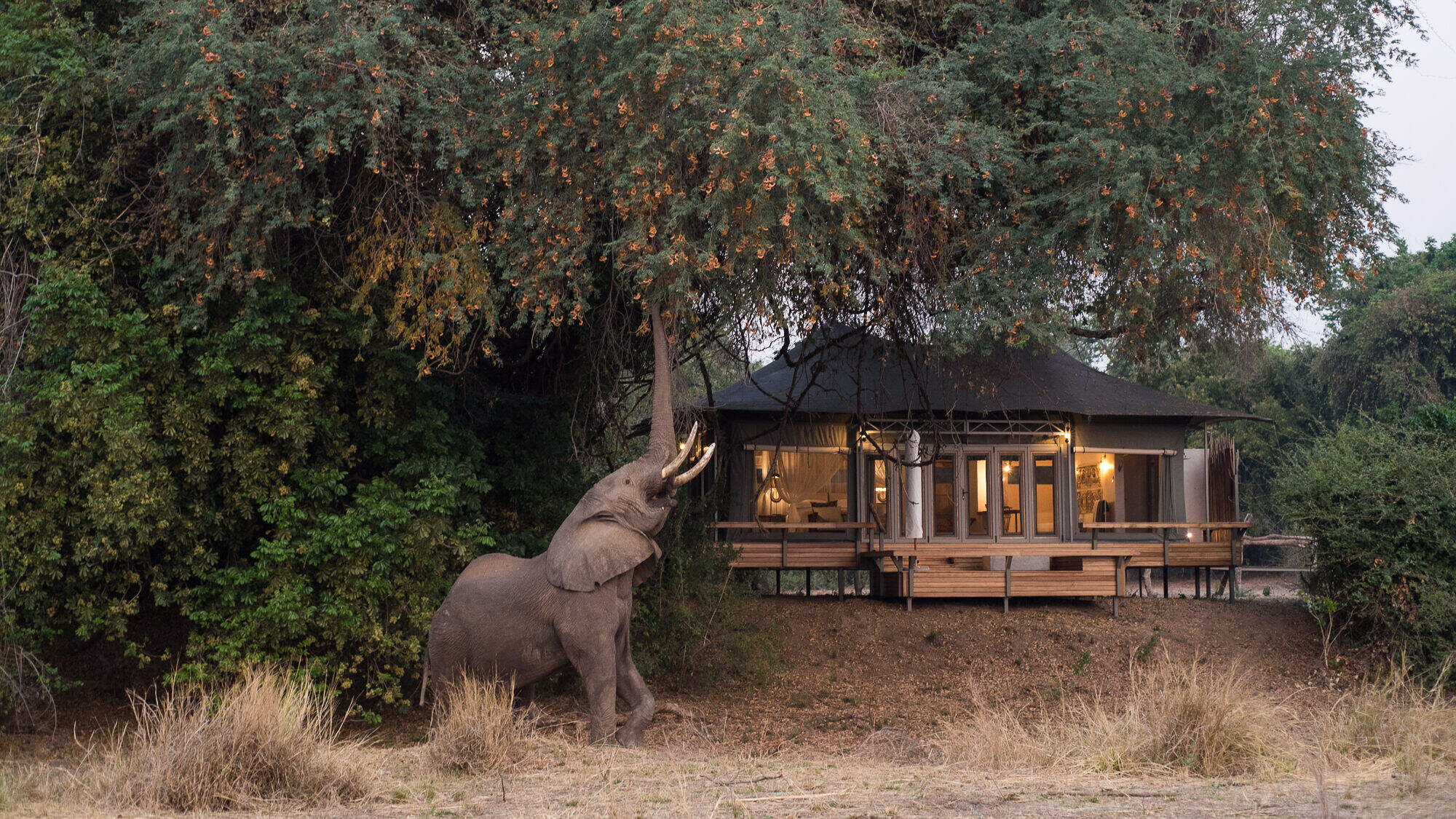
Chikwenya Camp
One of the original properties in Mana Pools area we are excited to be featuring Chikwenya Camp again.
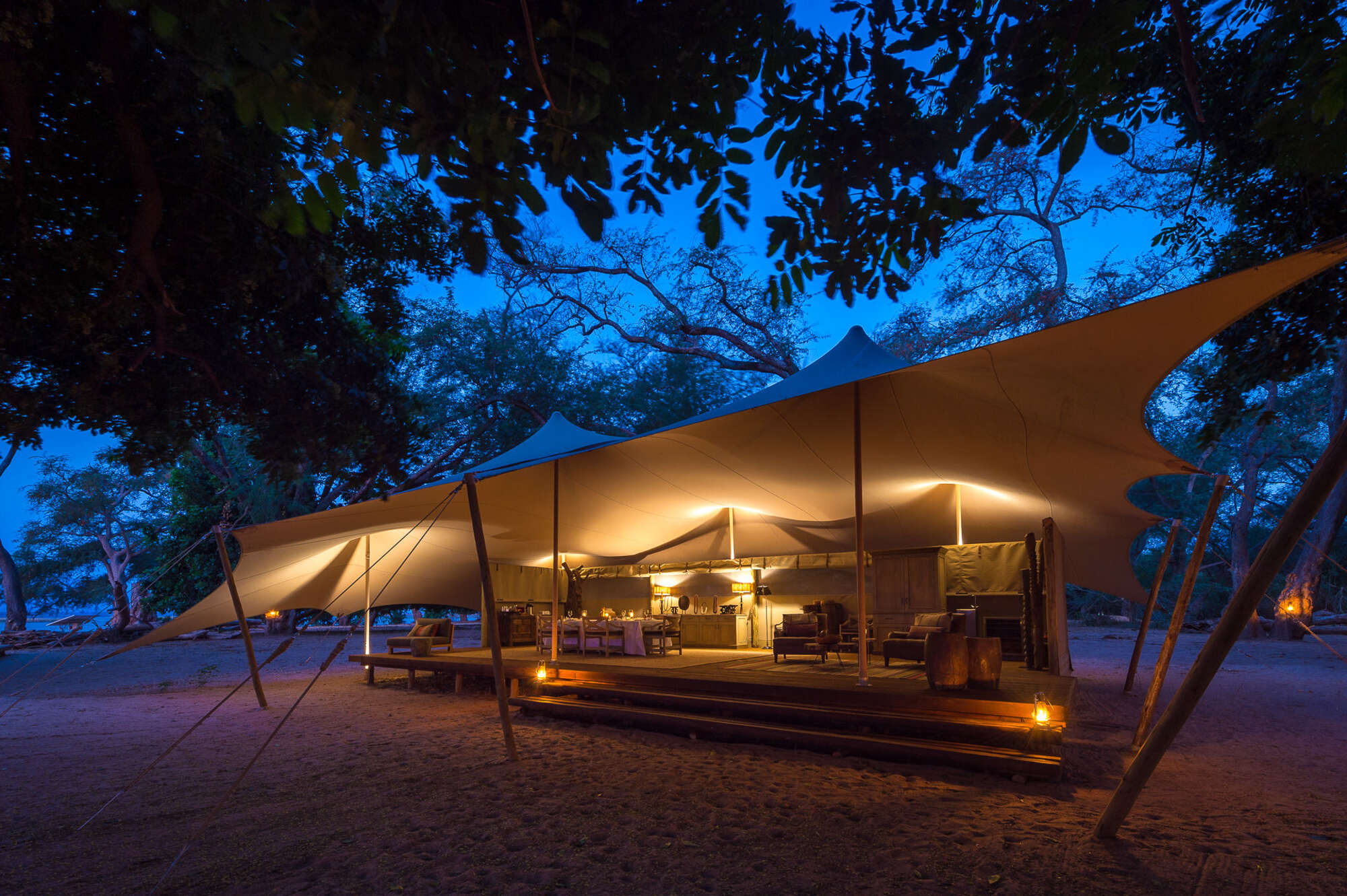
Little Ruckomechi
In a shady spot beside the Zambezi, Little Ruckomechi is a small but luxurious camp offering a reange of activities including walking and canoe trips.
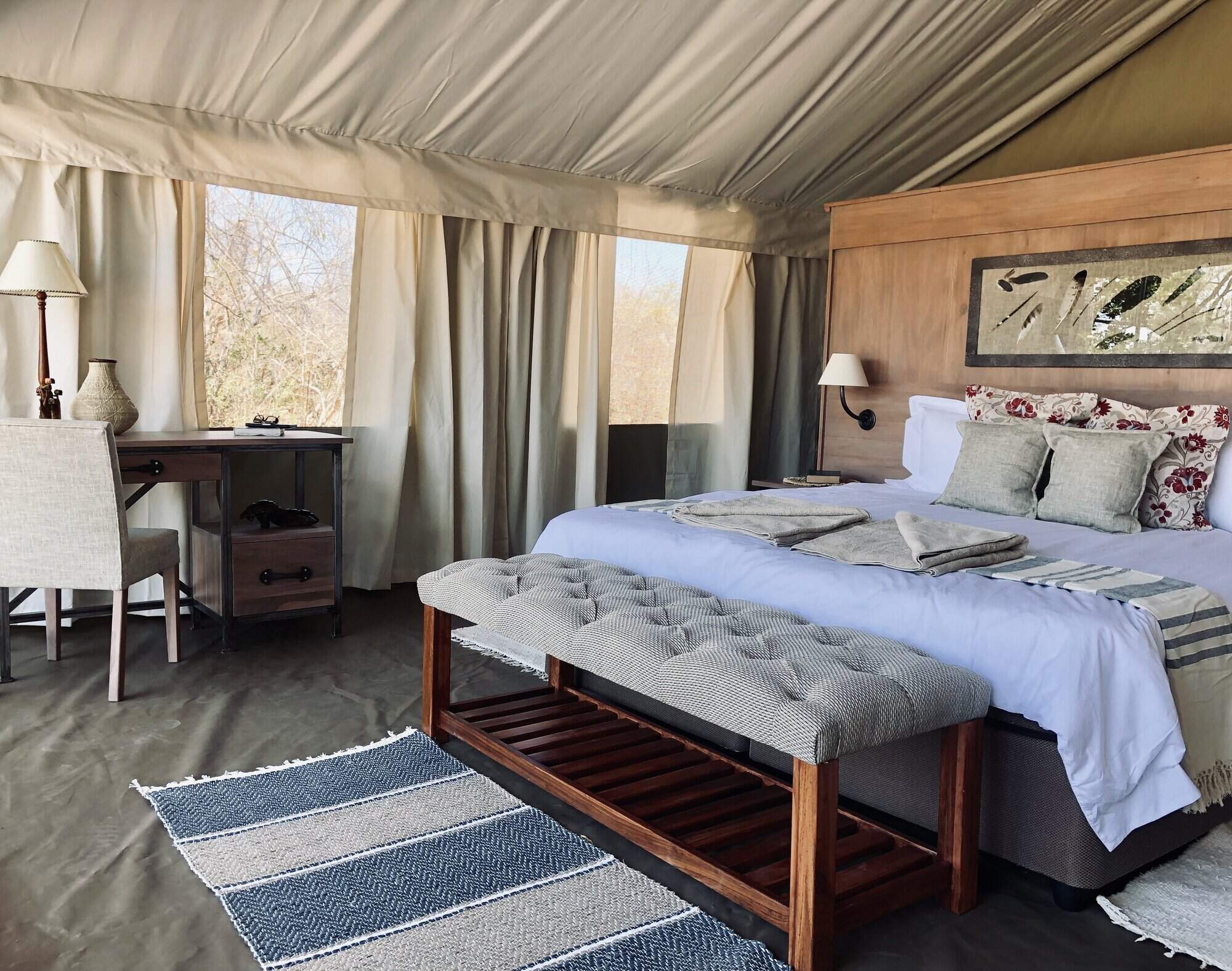
Ingwe Pan Camp
Ingwe Pan Camp is due to open in May and will be located in a remote area in the north of the Mana Pools National Park
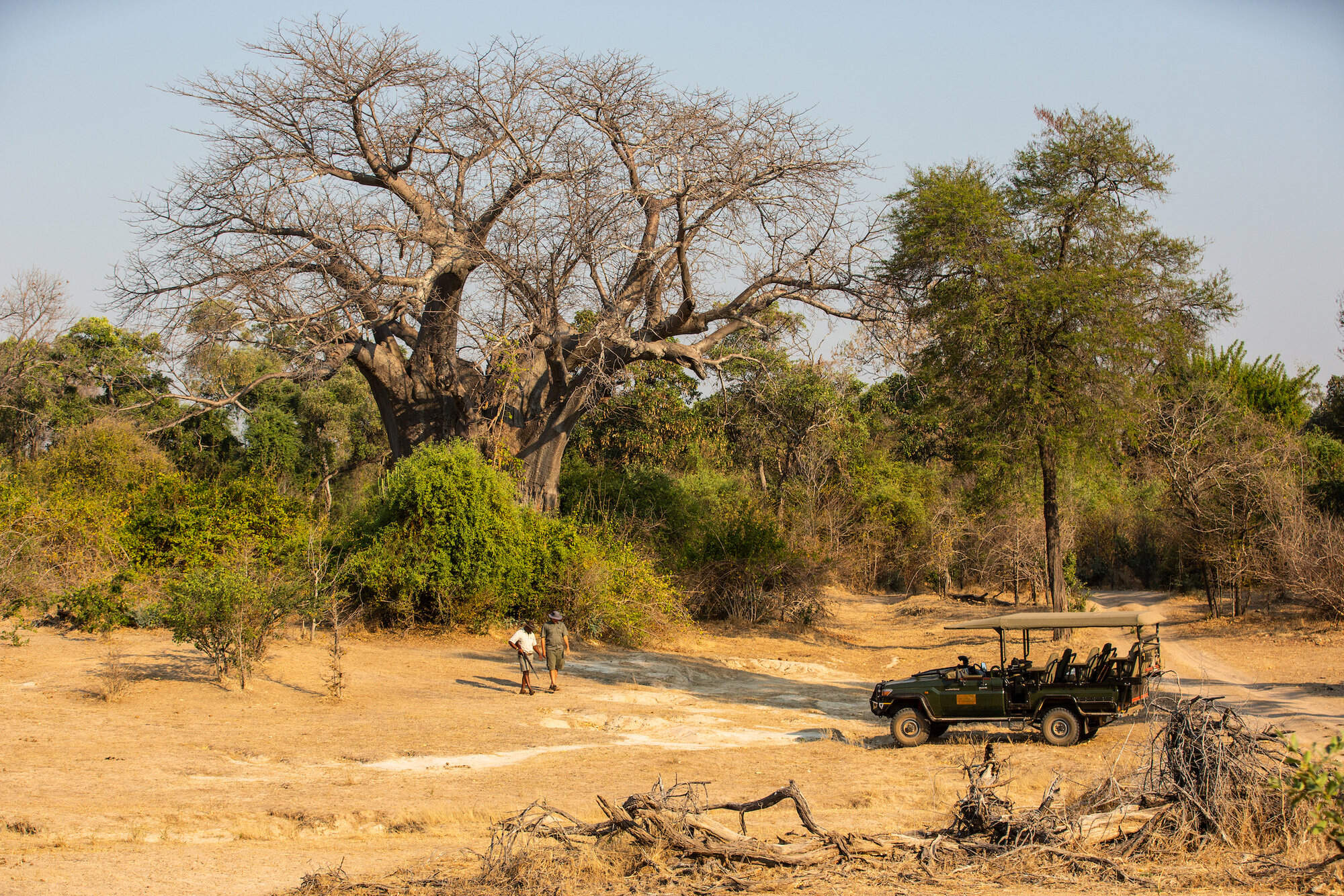
Tembo Plains Camp
Building commenced on Tembo Plains Camp in February 2021. Details are sparce at this stage but we'll update this page once we know more.
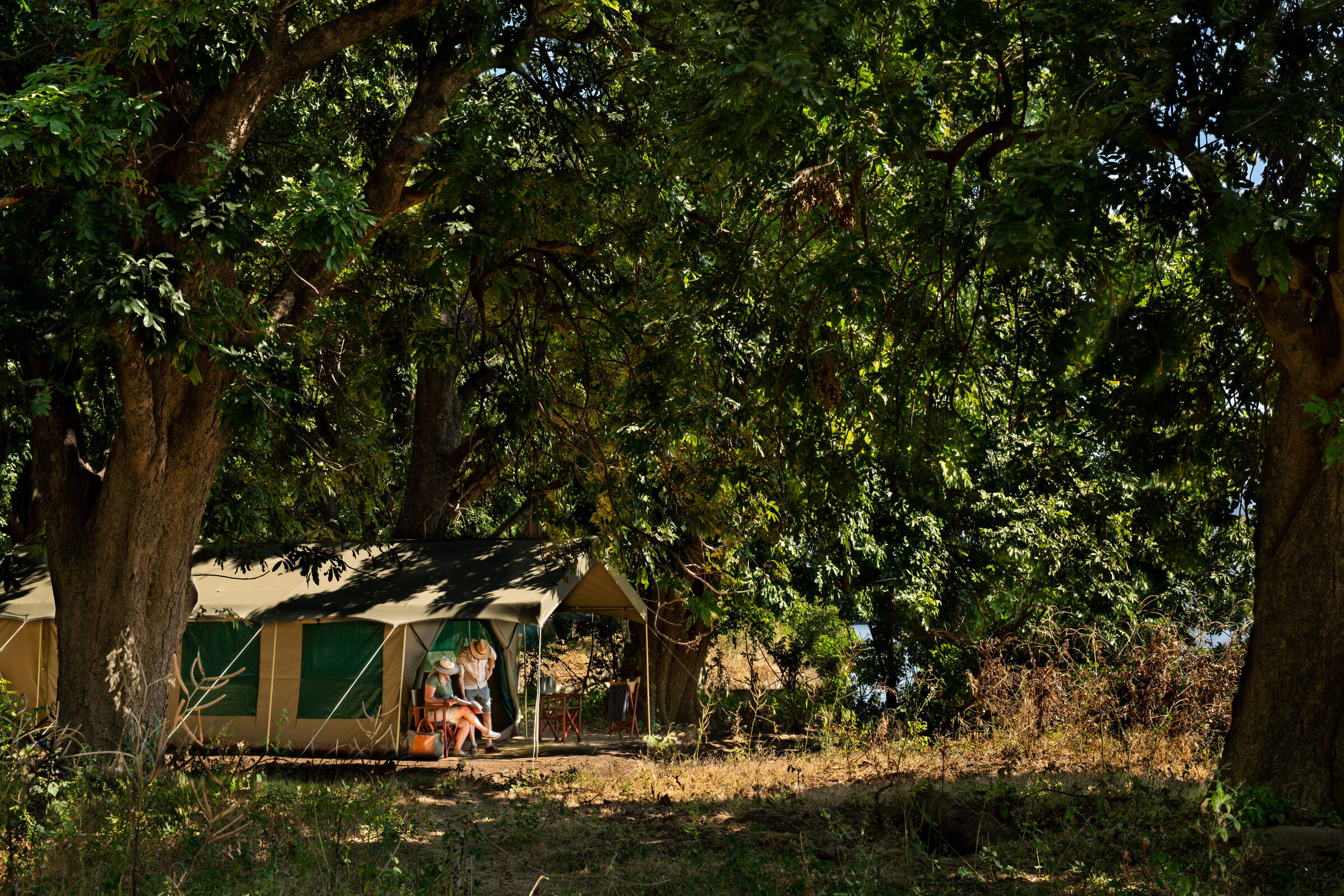
Mana River Camp
Mana River Camp sits on the banks of the Zambezi River, a site formerly occupied by Mwinilunga Camp.
Our travellers’ wildlife sightings in Mana Pools
This is their success for sightings in Mana Pools National Park. Click on a species for more detail. How we work this out.

100% success

97% success

95% success

87% success

85% success

84% success

66% success

58% success

33% success

17% success

15% success

7% success

4% success

2% success

0% success
When to go to Mana Pools National Park
Our month by month guide: What it's like to visit Mana Pools in Zimbabwe
Jan
Feb
Mar
Apr
May
Jun
Jul
Aug
Sep
Oct
Nov
Dec
Zimbabwe in January
January falls in the middle of Zimbabwe’s rainy season and is the wettest month of the year. Heavy rainfall occurs most days, flooding seasonal rivers and waterholes, with the occasional sunny spell.
With the high levels of precipitation the wildlife in the national parks becomes widely dispersed, taking advantage of the abundance of food and water, and is easily hidden by the thick, green bush.
While sightings of larger animals are possible, and many species drop their young at this time, game viewing is often sparse. However, many migratory species of bird arrive in Zimbabwe making it a peak month for birding.
The rains create incredibly sticky mud in Mana Pools National Park, preventing access and causing camps to close for the season. The majority of the camps in other parks remain open, with low rates attracting a smattering of visitors.
- Peak of the rainy season: hot & humid with heavy rain most days
- Bush exceptionally thick and green, with poor game viewing
- Species such as impala drop their young
- All camps in Mana Pools closed
- Very few visitors, and low rates at open camps
Our view
A time to avoid if possible
Weather in January
Zimbabwe in February
February remains well within Zimbabwe’s rainy season. Although total rainfall drops, relatively short thunderstorms can still be expected most afternoons. On the plus side, there is a greater chance of some sunshine in-between.
Much of the country remains waterlogged, closing access to Mana Pools and severely restricting walking safaris in other parks. While game drives and canoeing remain an option, the abundance of water disperses animals, and thick grass can make it difficult to spot larger species, but birding remains excellent. Conversely, this is a great time of year to view the landscape, and is excellent for photographers. Sporadic cloud cover and clear air can make for some spectacular sunsets too, particularly over Lake Kariba and the Zambezi River where the reflections off the water add to the beauty.
- Generally wet with frequent thunderstorms & hot humid days
- Poor wildlife viewing due to dispersed animals & thick bush
- Clear air, green landscapes & exceptional sunsets
- All camps in Mana Pools closed
- Very few visitors & low rates at camps that are open
Our view
This is not a great time to visit
Weather in February
Zimbabwe in March
March is the final month of Zimbabwe’s rainy season, when the rains start to trail off and sunny days become the norm. However, some days the clouds can still build, breaking into thunderstorms in the afternoon.
Mana Pools remains closed throughout the month but the majority of camps in Hwange, Matusadona and Gonarezhou remain open. Here, the landscape is green and alive, with migrant species of birds taking advantage of the abundant insect life. Larger animals remain elusive though, and walking safaris remain restricted.
By this time of year, the rains have normally trickled down to the Zambezi River and the flow of water over the Victoria Falls starts to increase, but without kicking up too much spray to obscure the views.
- Last month of the rainy season: hot, humid days with occasional storms
- Lush vegetation means good birding, but poor game viewing
- Views of the Victoria Falls improve
- All camps in Mana Pools closed
- Open camps have few visitors & low rates
Our view
This is not a great time to visit
Weather in March
Zimbabwe in April
April marks the end of Zimbabwe’s rainy season and the end of summer. Clear skies are the norm, with just the occasional shower. Temperatures start to drop, failing to reach 30ºC most days and dropping down to around 10ºC at night.
As the rain fades the landscape starts to dry out. While the vegetation remains thick and green, the soil in Mana Pools dries enough for camps to open, and the only camps to remain closed are the most remote bushcamps in Hwange. Although viewing of larger animals remains tricky, the improved weather starts to draw back visitors, as do prices significantly below those in the peak season.
The Zambezi River and flow of water over the Victoria Falls is at its highest, although large amounts of spray diminish views of the waterfall itself.
- Transitional period, with much lower rainfall & falling temperatures
- Wildlife is still dispersed & hard to see, but sightings improving
- Views of the Victoria Falls often obscured by spray
- Camps in Mana Pools open
- Visitors start to return & camps increase their rates
Our view
A good time to visit, with pros & cons
Weather in April
Zimbabwe in May
The first month in the dry season, May is also Zimbabwe’s first month of winter. If the rains are particularly late in a given year, you may catch the odd shower, but you can expect clear and sunny days the majority of the time. While it’s warm in the daytime, temperatures drop to single digits at night, so bring a warm jumper and gloves for early morning drives.
With the rain having cleared the air, the sky is bright blue, and it’s the best time of year for photography.
Even the most remote camps in Zimbabwe are now open. With the lack of rainfall, vegetation dies back significantly, and seasonal rivers return to sand. Not only does this open up the possibility of walking safaris, but wildlife viewing becomes much more reliable.
- Start of the dry season, with milder days and cold nights
- Game viewing significantly improves as vegetation dies back
- Vegetation starts to turn from green to brown
- Best time for photography with crystal clear air
- Visitors start to return; all camps open & rates increasing
Our view
A very good time to visit
Weather in May
Zimbabwe in June
During June you can virtually be guaranteed of dry and sunny days, although temperatures continue to drop, and can get close to freezing at night in Hwange National Park. Jumpers, jackets and gloves are strongly recommended for early mornings and evenings.
The opportunities for wildlife viewing improve throughout the month as the landscape rapidly dries, and the animals start to gather on the banks of the Zambezi River and around Hwange’s waterholes.
Water levels in the Zambezi River start to drop, reducing the amount of spray kicked up at the Victoria Falls and greatly improving visibility, but still allowing a full curtain of water to cascade over the edge.
- Middle of winter, with night-time temperatures close to freezing
- Game viewing significantly improves throughout the month
- Views of the Victoria Falls are at their best
- Noticeable increase in visitor numbers
- Camps considerably more expensive
Our view
A very good time to visit
Weather in June
Zimbabwe in July
July sits in the middle of Zimbabwe’s dry season. Although it’s warm at midday, temperatures are generally cold and in Hwange it’s been known to drop below freezing at night, with the lower-altitude Mana Pools feeling a bit warmer.
With wildlife clustering around the few remaining waterholes, sparse vegetation, and some of the best views of the Victoria Falls, this is one of the most popular times to travel, with camps charging peak season rates to reflect this. That said, visitor numbers to the country in general remain low, and outside of the Victoria Falls it’s rare for any areas to feel crowded.
- Middle of the dry season with almost no chance of rain
- Clear sunny days, but very cold nights
- Wildlife viewing good; game drives and walking safaris unrestricted
- Views of the Victoria Falls at their best
- Camps charging peak season rates
Our view
A very good time to visit
Weather in July
Zimbabwe in August
While August is the end of winter and temperatures are starting to creep up, mornings and nights are still cold, and game drives in open vehicles can feel particularly chilly. Well into the dry season, the landscapes will have mostly transformed from green to brown and wildlife viewing in Zimbabwe’s national parks is approaching its best. Due to dust kicked up into the atmosphere and smoke from bush fires you may start to notice a haze on the horizon, but this doesn’t significantly impact photography.
August is one of the most expensive months, and the pleasant weather and decent game viewing attracts lots of visitors. While the national parks rarely feel crowded, Victoria Falls accommodation can sell out a year in advance.
- Warm, sunny days but cold mornings & nights; almost no chance of rain
- Wildlife viewing nearly at its best
- Landscape turns brown, & an atmospheric haze develops
- All camps charging peak season rates
Our view
Fantastic: the very best time to visit
Weather in August
Zimbabwe in September
Temperatures in September rarely drop below 15ºC, but are yet to reach the oppressive highs of summer. It will normally have been five months since the last drop of rain, so antelope and elephants cluster around whatever water remains, with predators never too far away.
The landscape is very brown, and the haze building on the horizon takes some of the colour out of the sky, so while animal subjects are plentiful, the background is not ideal for photography.
The combination of incredible wildlife viewing, hot and sunny weather, and cheaper flights outside of the school holidays make this the most popular time of year to travel, and availability at the camps can become limited up to a year in advance.
- The best month for weather, with a pleasantly warm temperature range
- One of the best months for game viewing
- Victoria Falls starting to dry but still impressive on Zimbabwean side
- All camps are charging peak season rates
- Most popular time to travel, & space can be limited
Our view
Fantastic: the very best time to visit
Weather in September
Zimbabwe in October
October is the last month of the dry season with little chance of rain but building humidity. While the higher elevation of Hwange National Park limits temperatures to the 30s Celsius, they can easily top 40ºC in Mana Pools.
With little vegetation or water, wildlife is drawn to the few remaining water sources and viewing is at its best; visitors who brave the heat can be rewarded with some exceptional sightings, although haze in the air diminishes photos. Maximum visibility and dense wildlife concentrations can also make for very rewarding walking safaris, although the heat can make them uncomfortable.
Water levels in the Zambezi at the Victoria Falls drop significantly, and large stretches of the waterfall are a dry cliff-face – although it never dries completely. Camp rates remain at their peak, but visitor numbers drop as people avoid the heat.
- Last month of the dry season; very hot with building humidity
- Wildlife viewing at its very best
- Dust & smoke in the air diminish photographic opportunities
- Victoria Falls starting to look very dry
- Camp rates remain at their peak
Our view
A very good time to visit
Weather in October
Zimbabwe in November
November is a transitionary period, with high temperatures and humidity. While they can’t be predicted with any precision, the first rains normally arrive halfway through the month, in the form of thunderstorms lasting a few hours each day.
Early November is a popular time to travel as the camps drop their rates, so if you’re lucky you can get peak-season game viewing at low-season rates. This is a gamble though as if the rains do arrive, animals are no longer limited to a few dangerous waterholes and will disperse into the bush. While all the camps in Mana Pools intend to remain open, the rains can make the airstrips unusable so you may find yourself moved to a different park, a risk that increases through the month.
- Typically the start of the rains in Zimbabwe
- Temperatures & humidity levels remain high
- Wildlife viewing rapidly diminishes as the rains arrive
- Camps remain open, but risk early closure in Mana Pools
- Much cheaper time to travel as camps drop their rates
Our view
A good time to visit, with pros & cons
Weather in November
Zimbabwe in December
By December the rainy season has begun in earnest; this is one of the wettest months in Zimbabwe, with heavy thunderstorms most afternoons and occasionally continuous rain for a couple of days. While temperatures start to cool down the high levels of humidity can make the heat feel more oppressive.
With the rains comes an explosion of green growth, and the dust and smoke are washed out of the air. The resulting scenery – with the occasional bright blue skies – can be fantastic for photographers. Thick vegetation and plentiful water makes viewing of larger animals tricky, but with migratory species arriving the birding is at its best.
All camps in Mana Pools and the remote Hwange camps close, with those remaining open charging their lowest rates.
- One of the wettest months in Zimbabwe
- High temperatures & levels of humidity
- Wildlife viewing poor, but birding good
- Lush green landscapes & clear air; great for landscape photography
- All camps in Mana Pools closed
Our view
This is not a great time to visit
Weather in December
Mana Pools National Park: In detail
A guide to Mana Pools National Park
Safaris to Mana Pools
This isolation, combined with the sticky black-cotton soil that makes up most of the substrate in the area, makes access almost impossible in the rainy season. Visiting Mana Pools on safari is thus limited to the dry season, between April and November.
Activities on a Mana Pools Safari
Game drives in open-topped safari vehicles are a fixture of all camps, as are canoeing trips on the river. These can be half-day, full-day or even multiple-day trips, with participants on the latter camping overnight on the riverbank. Catch-and-release fishing is also possible from most camps. However, motorboats are not permitted within the national park, so motorised activities on the water are an option only in Ruckomechi’s private concession to the west.
Walking safaris are one of the stand-out activities in Mana Pools. Unusually, these have been encouraged by the authorities since the park opened in 1963. In addition, with a low human population in the surrounding area, the human-wildlife conflict has historically been minimal, so the game is relatively relaxed when encountered on foot – and with some guides you can reliably approach elephant, lion and wild dog to within an incredibly close distance.
Wildlife of Mana Pools
During the rainy season, much of the wildlife retreats from the wet ground on the valley floor and heads for the escarpment. Then from around April, as the pools in the bush dry up, they start to return to the riverine areas. As the year progresses, increasingly large herds of elephant and buffalo are seen, as well as zebra, kudu, eland, impala, and many other antelope species. Mana Pools is particularly well-known for its large bull elephants, many of which return to the same areas in the park year on year. As a result, several guides have known individual elephants for many years, and are comfortable getting exceedingly close to them on foot – an unforgettable experience, particularly if you are lucky enough to see them standing on their hind legs, stretching for albida seedpods towards the end of the dry season.
With such healthy populations of plains game, the predators are also well represented here. There are several sizeable prides of lion, which are seen on a regular basis both from vehicles and on walks. Mana Pools is also a stronghold for wild dogs, and is notable not only for regular sightings of these endangered predators, but also for individual guides who can get you incredibly close on foot. Leopard, cheetah and spotted hyena are also present, but these tend to be shyer, and are more rarely seen by visitors.
There are two notable species that are not present in the park: giraffe and rhino. While giraffe have never been present in the area, the eastern black rhino used to have a strong population in Mana Pools. By the mid 90s, however, poachers had reduced the population to just ten individuals, which were then transferred to the intensive protection zone (IPZ) within Matusadona National Park.
Birds of Mana Pools
Along the river you can easily spot several species of kingfisher, as well as darters, cormorants, herons and storks, with African fish eagles frequently perched in the trees above the water. Between August and November, colourful colonies of carmine bee-eaters nest in the sandy riverbanks, and rare treats include Pels’ fishing owl and African skimmers.
Inland, some of the more notable species are the Nyasa lovebird, Livingstone’s flycatcher, white-collared pratincole, banded snake eagle and yellow-spotted nicator.
Map of Mana Pools National Park
Choices for where to stay in Mana Pools National Park

Mana Pools National Park: Safaris
In the extreme north of Zimbabwe, beyond the mountainous escarpment which lines the rift valley that we know as the "Lower Zambezi Valley", Mana Pools National Park isn't at all easy to access. There is a long route, via road and boat, from Lusaka, but most visitors fly here instead - from Victoria Falls, Hwange, or Harare.
When you get here, it's worth it. Mana is a truly magical park, certainly one of Africa's best. So as many of these trips reflect, once you've made the effort to get here, it's well worth enjoying an extended stay - and we'd think of about a week in Mana Pools being a good length of time here if you can spare it.
Read on for trip ideas which include Mana - and then discuss your ideas with you as we help to plan your trip:

Lion Safari
7 days • 2 locations
VICTORIA FALLS AIRPORT TO VICTORIA FALLS AIRPORT
The classic Expert Africa Zimbabwe safari. Combining two of our favourite independent camps, each run by celebrated guides, exciting game drives, world-class walks and canoeing in premier wildlife watching destinations.
US$7,300 - US$10,280 per person

Buffalo Safari
9 days • 3 locations
HARARE AIRPORT TO VICTORIA FALLS AIRPORT
Combining Zimbabwe’s Mana Pools and Hwange national parks with stays at intimate six-tent safari camps offering excellent walking, canoeing and game drives. Superb wildlife viewing and a real wilderness-focused experience.
US$8,840 - US$11,910 per person

Grysbok Safari
9 days • 3 locations
VICTORIA FALLS AIRPORT TO HARARE AIRPORT
Discover three of Zimbabwe’s iconic destinations in style, flying between Hwange, Mana Pools and Lake Kariba on this varied safari adventure staying at authentic yet luxurious camps.
US$11,070 - US$16,110 per person

Pied Kingfisher Safari
9 days • 3 locations
VICTORIA FALLS AIRPORT TO HARARE AIRPORT
A luxury safari combining three of Zimbabwe's top highlights. The trip uses some of the finest safari camps in Zimbabwe and is perfect for a family or small group.
US$8,470 - US$11,860 per person

Nyala Safari
10 days • 3 locations
VICTORIA FALLS AIRPORT TO VICTORIA FALLS AIRPORT
A superb luxury safari in iconic Hwange and Mana Pools national parks, staying in a pair of the finest safari camps in Zimbabwe, with a grand finale at Victoria Falls
US$12,060 - US$16,260 per person

Bat Hawk Safari
7 days • 2 locations
HARARE AIRPORT TO JOHANNESBURG AIRPORT
Explore two areas revered by safari enthusiasts with some of Africa’s best walking and some superb guiding – even by Zimbabwe’s high standards – for a varied and wonderfully immersive wilderness experience.
US$8,670 - US$9,130 per person
16 of our best lodges and safari camps in Mana Pools National Park
Mana Pools is deservedly one of Zimbabwe’s most popular wildlife destinations and the park facilities can become stretched in the main winter season. All of the accommodations listed below offer wonderful wildlife viewing experience coupled with a level of personal service and catering that few people would associate with ‘camping’. Ask us for more details of what's where, and what's likely to suit you best!

Vundu Camp
Overlooking the Zambezi River in Mana Pools National Park, Vundu Camp is a small, comfortable bushcamp offering top-notch guiding.

Ruckomechi Camp
In a very scenic spot beside the Zambezi, Ruckomechi is a smart camp offering excellent walking, river safaris, night and day 4WD game drives.

Kanga Bush Camp
Unspoiled and peaceful, Kanga Bush Camp is located in a remote and exclusive part of Mana Pools National Park, overlooking the Kanga Pan.

Stretch Ferreira Safaris
Stretch Ferreira Safaris Camp is a small, owner-run camp on the banks of the Zambezi River in Mana Pools National Park, with the emphasis on great guiding.

Zambezi Expeditions
Zambezi Expeditions is a simple, semi-permanent camp along the Zambezi River that offers excellent guiding and standards of service.

Nyamatusi Camp
Overlooking the Zambezi River, the luxury Nyamatusi Camp occupies a pristine wilderness environment.

Little Vundu
Closely associated with Vundu Camp, Little Vundu has the same great location and quality of guides, and is occasionally used for private group bookings.

Mana Canoe Trail
The Canoe Trail is a multi-day trip, along the Zambezi with some of the best guides in Africa. Each night you'll camp on the banks of the river.

Kavinga Safari Camp
Kavinga is a comfortable tented camp tucked away in a less-visited area of Mana Pools National Park with surprisingly good wildlife and an excellent hide.

Chikwenya Camp
One of the original properties in Mana Pools area we are excited to be featuring Chikwenya Camp again.

John's Camp
John's Camp is a semi-mobile tented camp offering walking safaris, game drives, and fishing in Zimbabwe's Mana Pools National Park.

Nyamatusi Mahogany
Nyamatusi Mahogany is a family-friendly, yet remote and luxurious safari camp in Mana Pools National Park.

Looking for inspiration on where to travel next?
Visit our trip chooser to explore your options and find inspiration for your perfect African adventure
Inspire meVideos from Mana Pools National Park
Watch these videos to learn more about Mana Pools National Park
